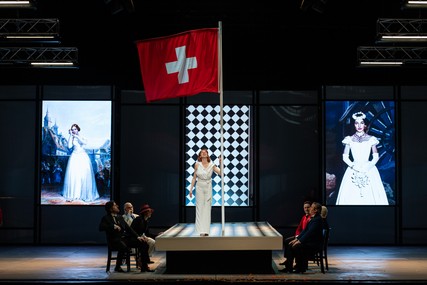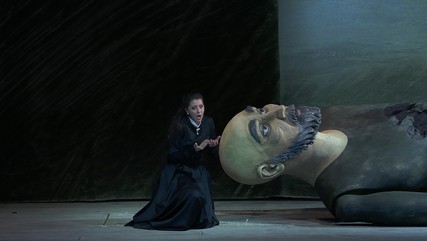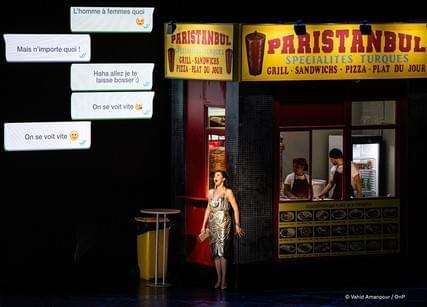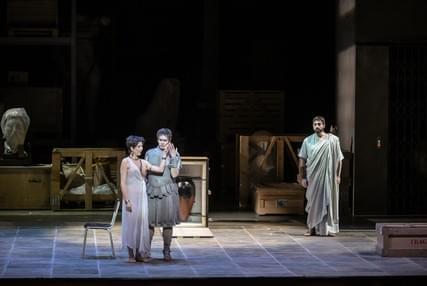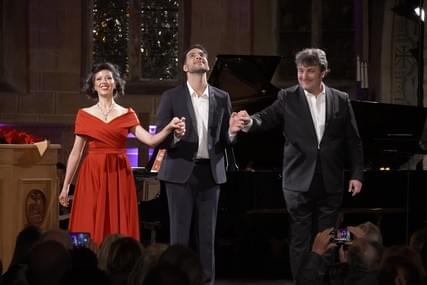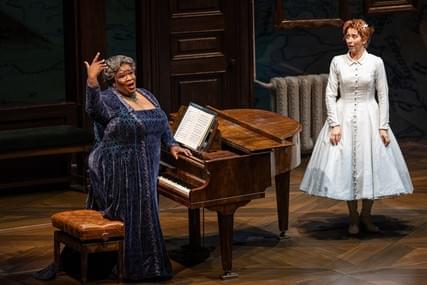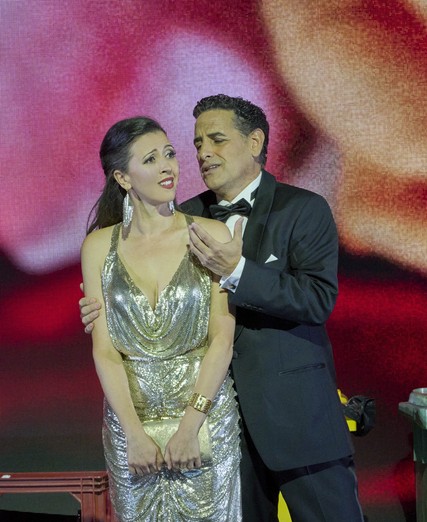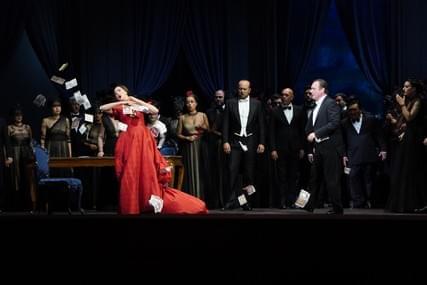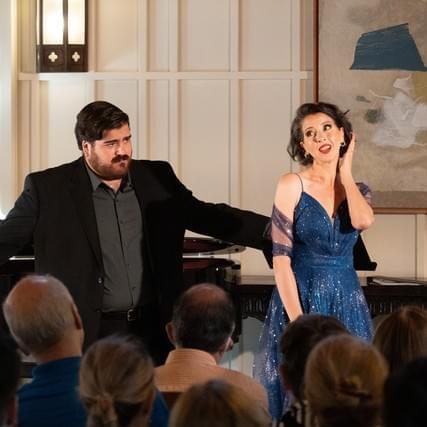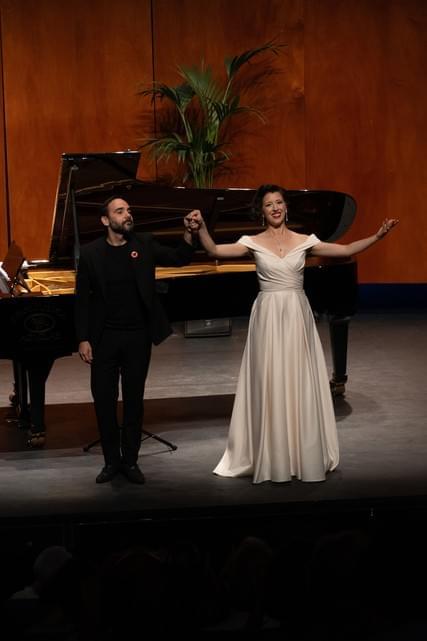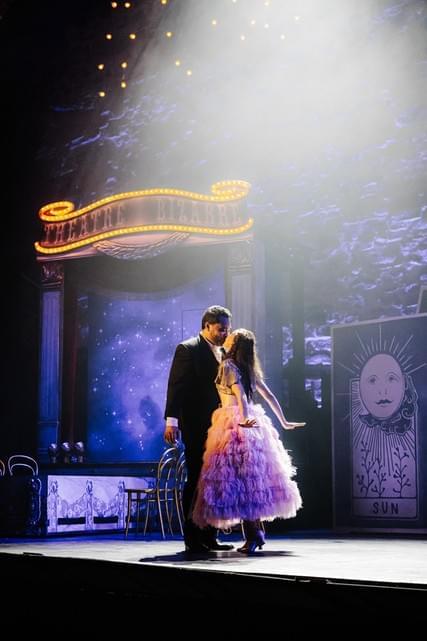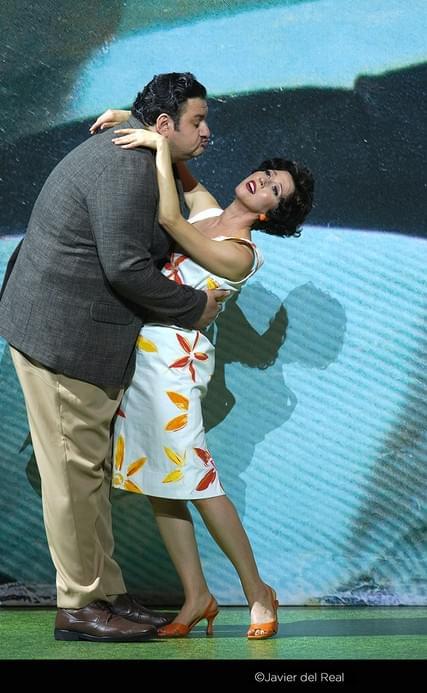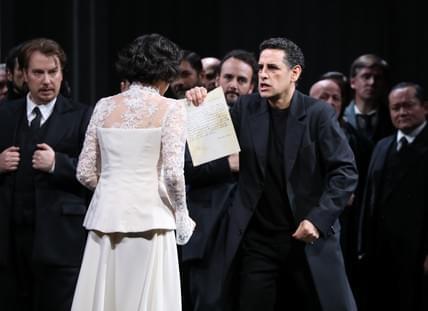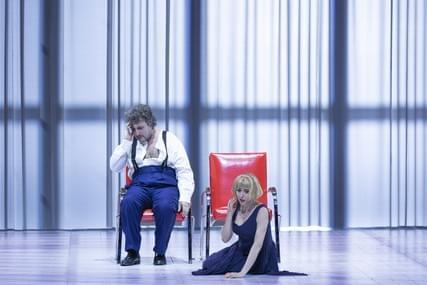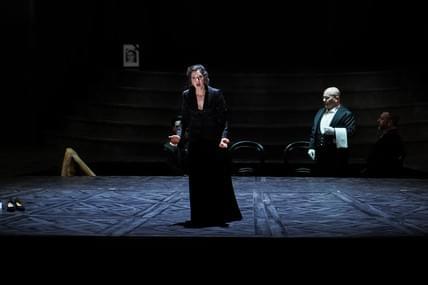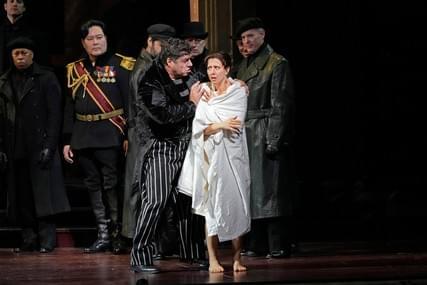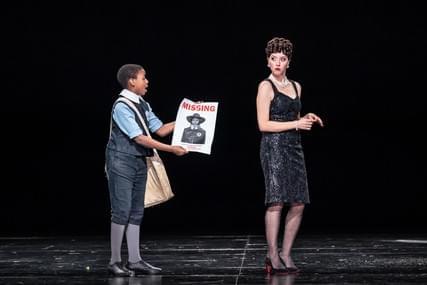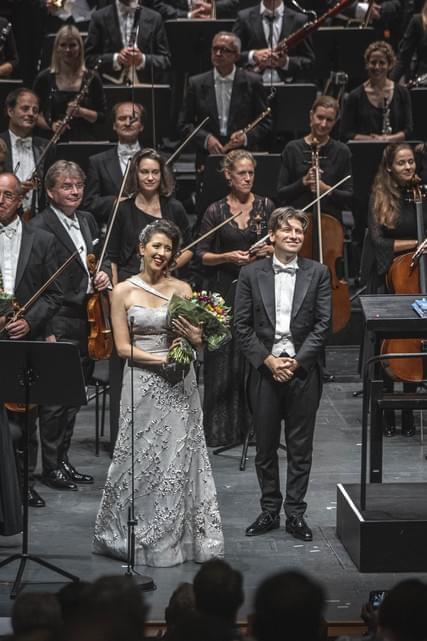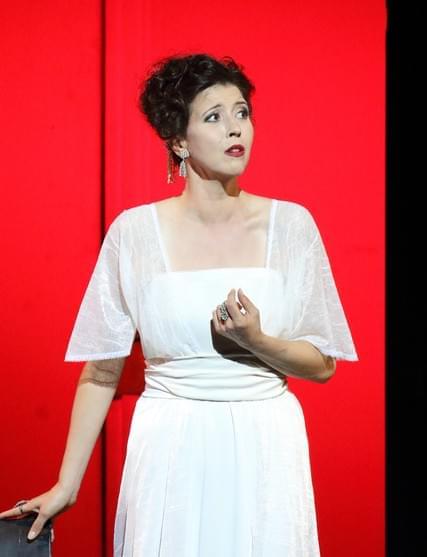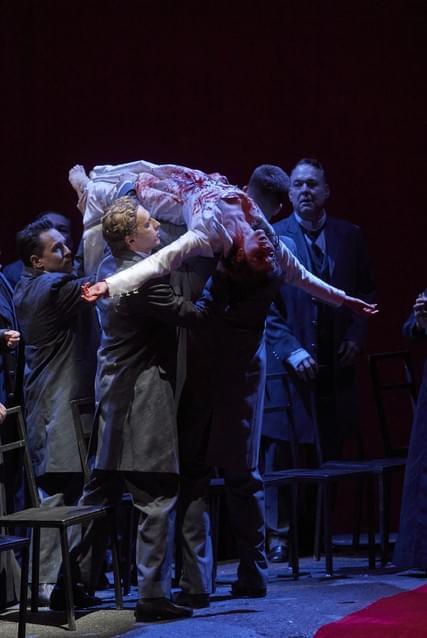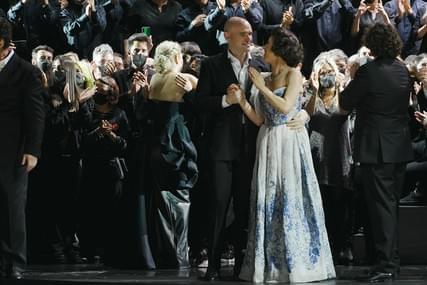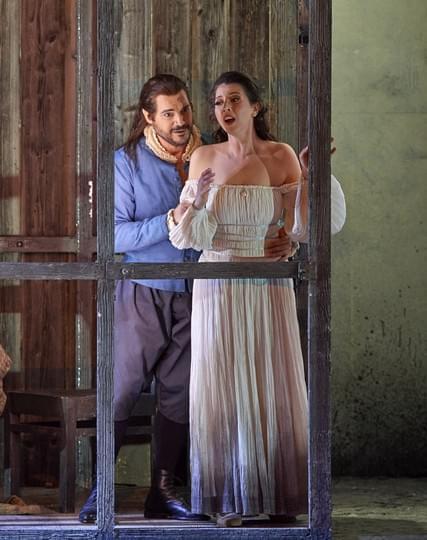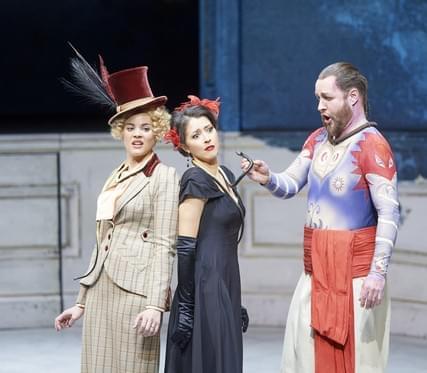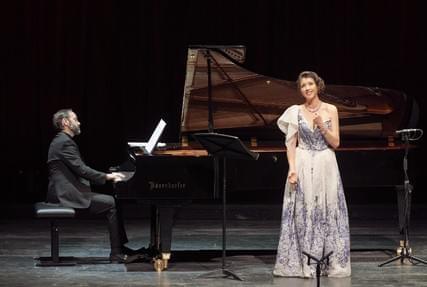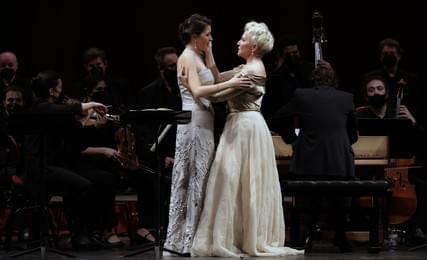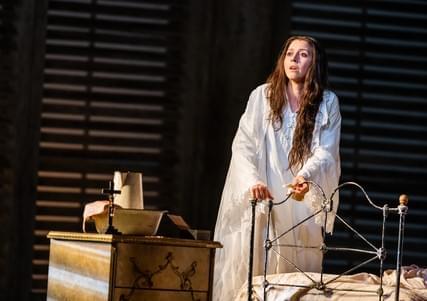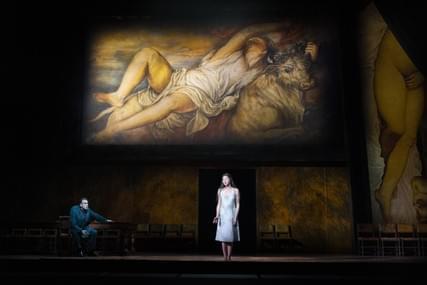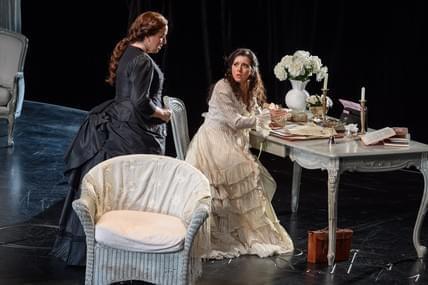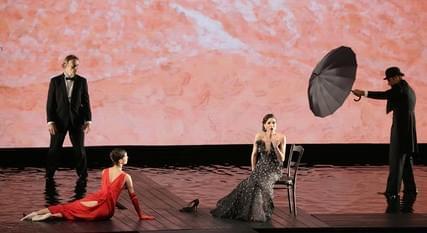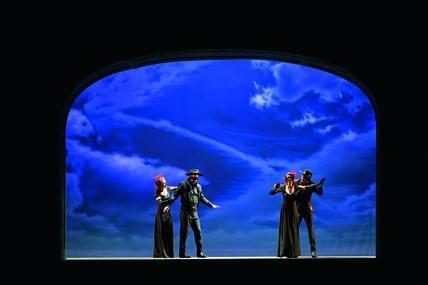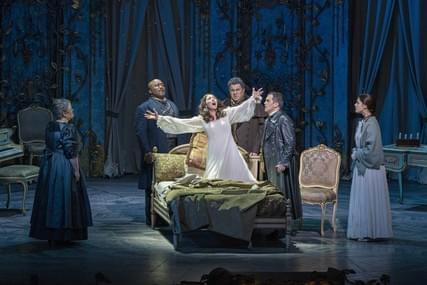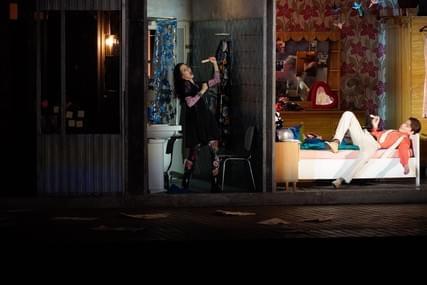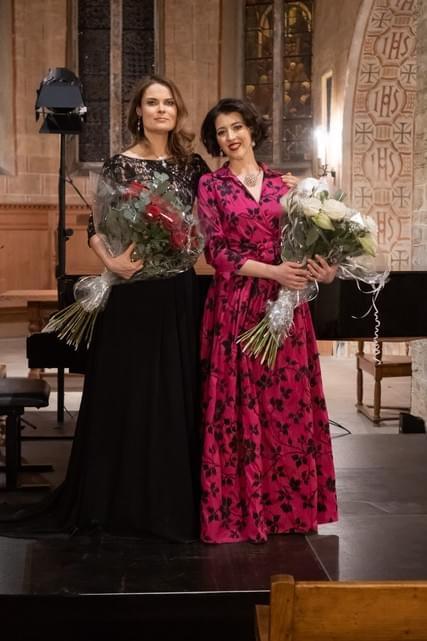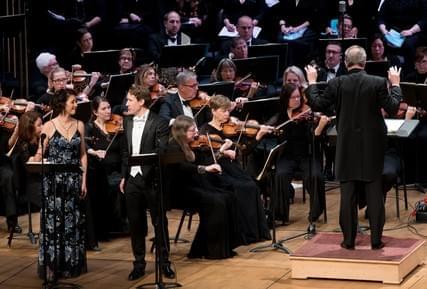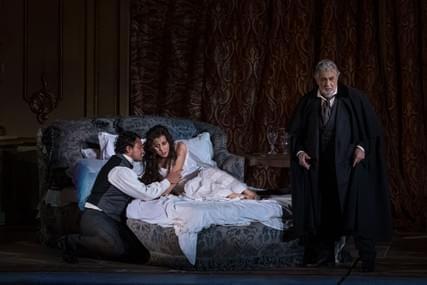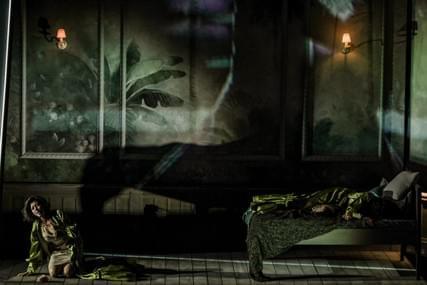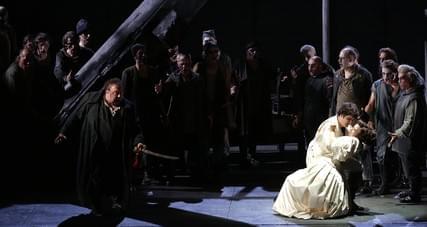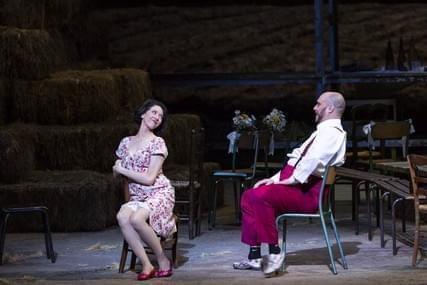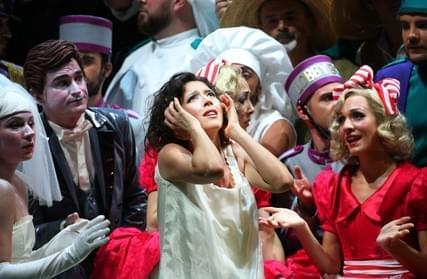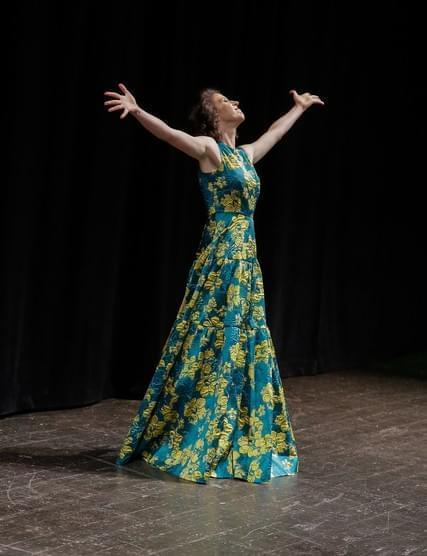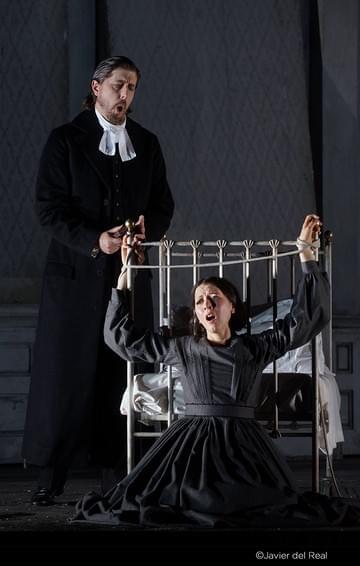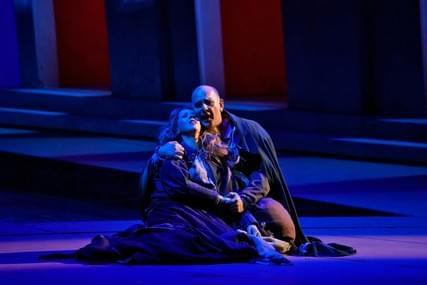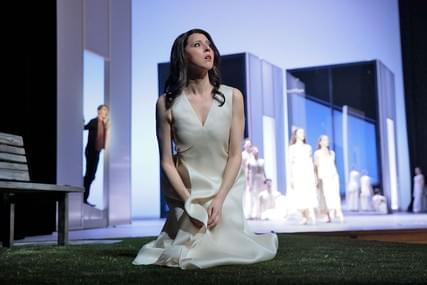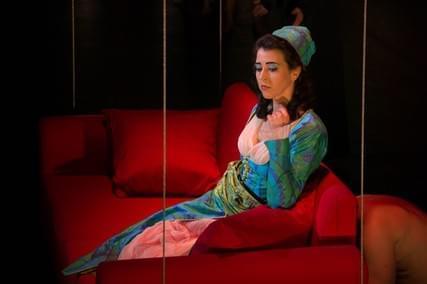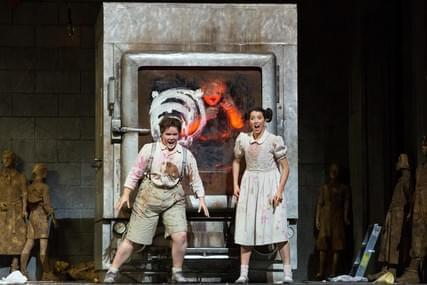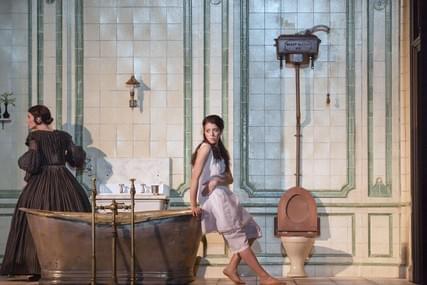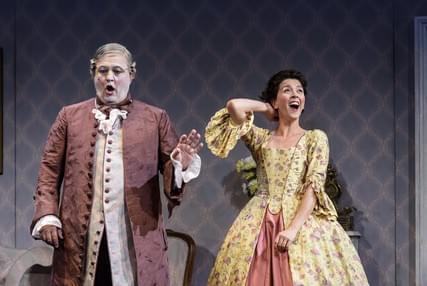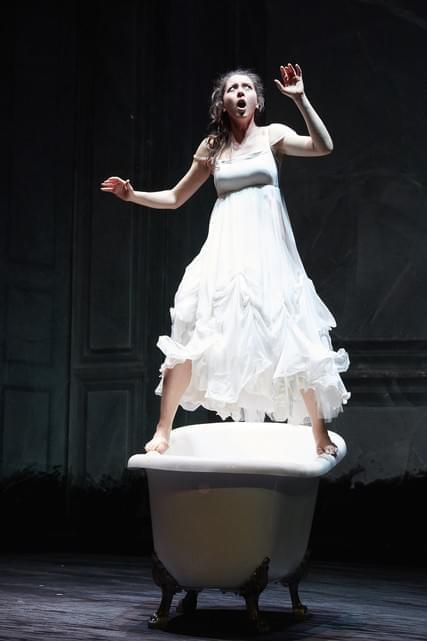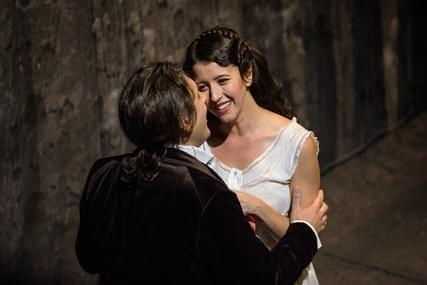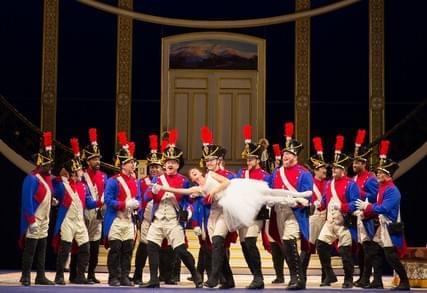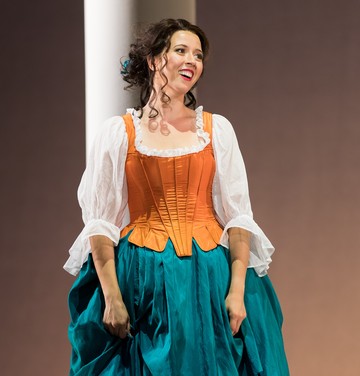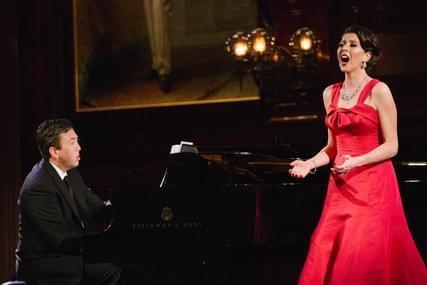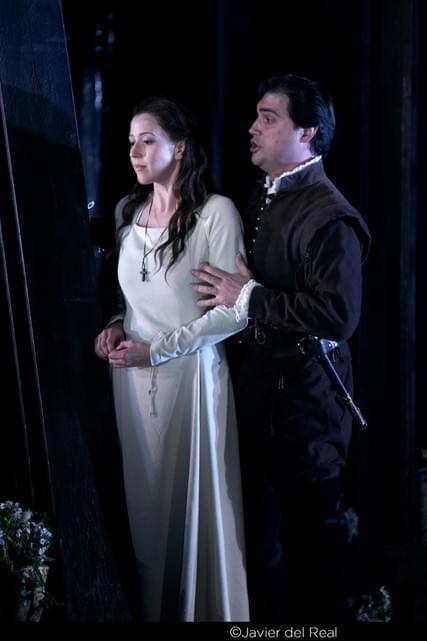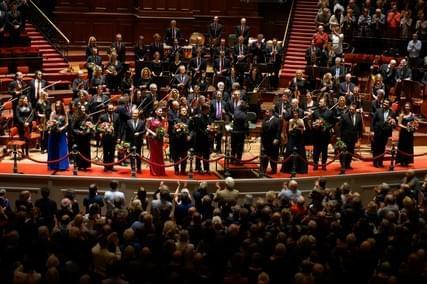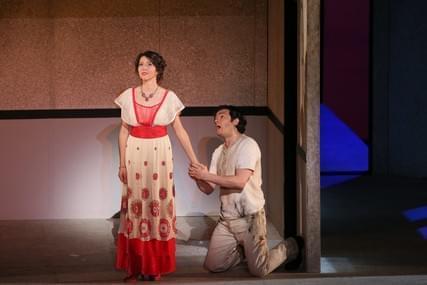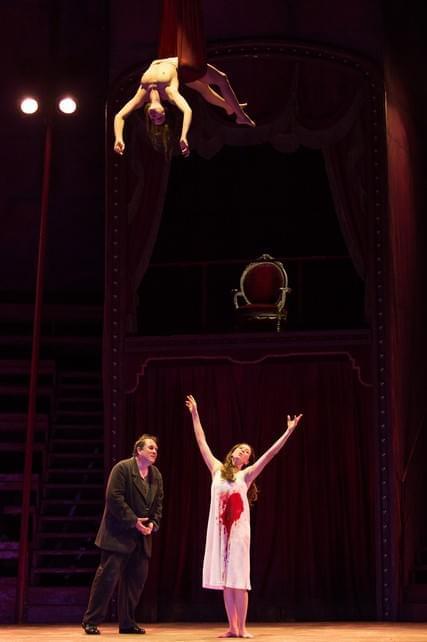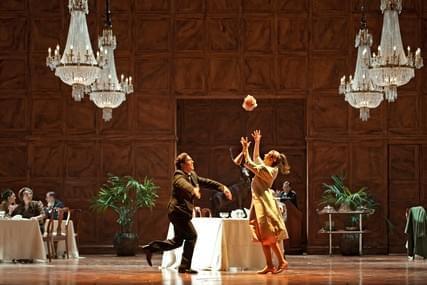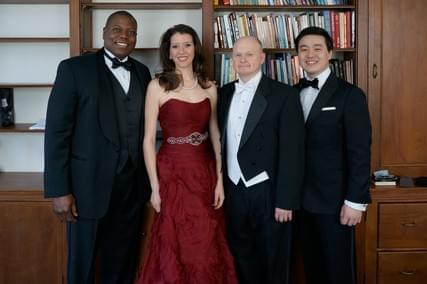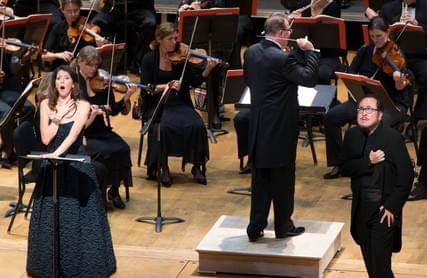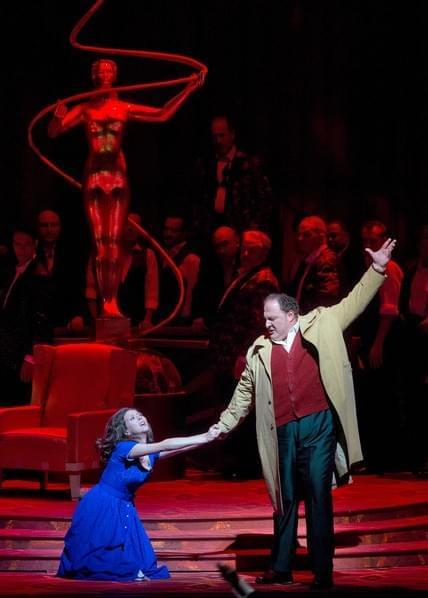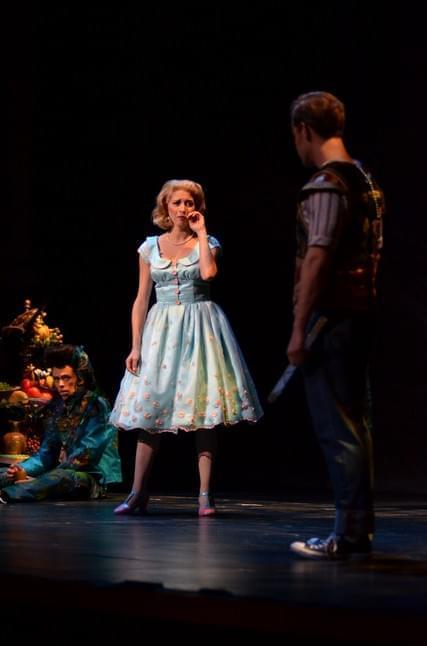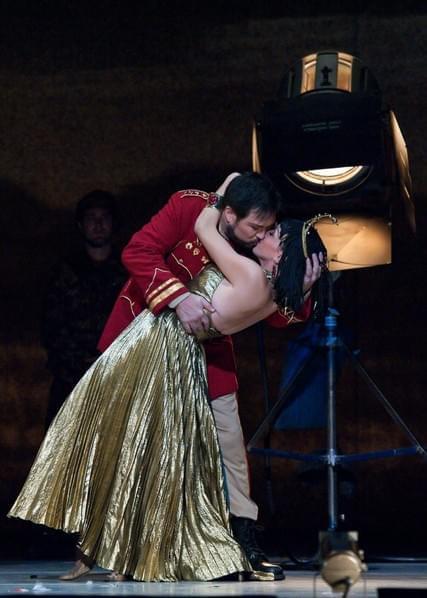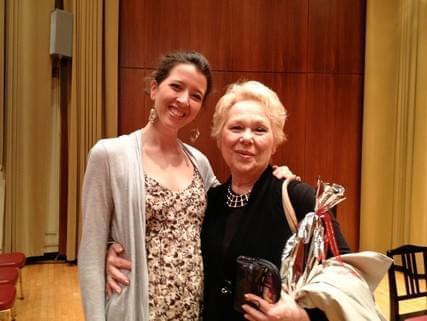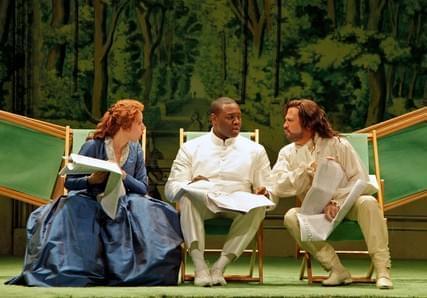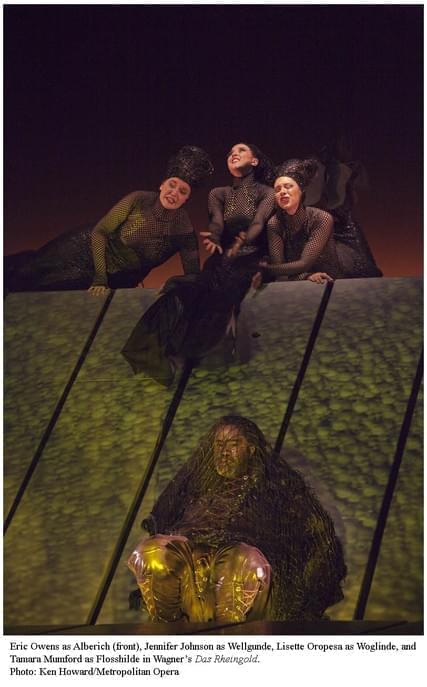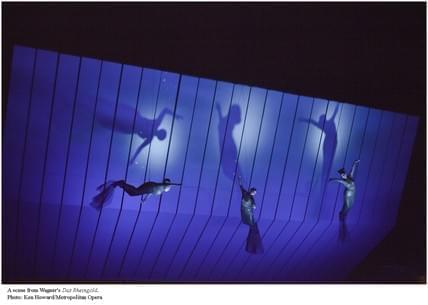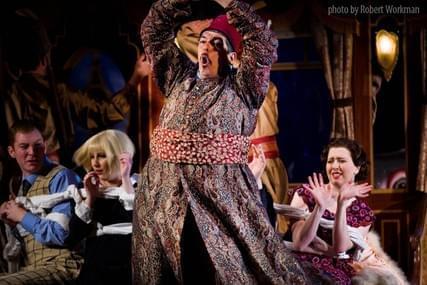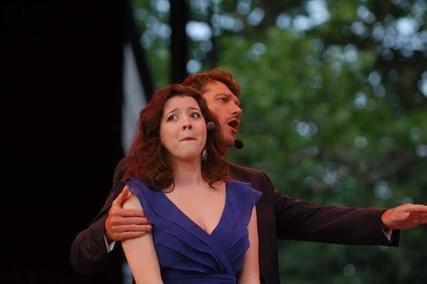Career
2024
Amina
Incanta la Sonnambula di Lisette Oropesa,
Lisette Oropesa, al debutto nel ruolo di Amina dopo essere stata protagonista con il lirico capitolino dell'opera-film La traviata per la regia di Mario Martone, ha dato sfoggio delle sue straordinarie capacità belcantistiche strappando applausi e 'brava' nei duetti come da sola nelle melodie più struggenti.
— ANSA • Ansa.itMathilde
WIEN/ Staatsoper: GUILLAUME TELL – nach 19 Jahren wieder im Repertoire
Lisette Oropesa sang die Matilde mit viel Gefühl, wunderschönem Timbre und sicherer Höhe.
— Johannes Marksteier • Online MerkerVioletta Valery
La Traviata à Bastille, ou la "grâce" des réseaux sociaux
Mais Violetta Valéry, en ce dimanche après-midi, n'est nulle autre que Lisette Oropesa, triomphale de puissance mélodieuse tout en incarnant parfaitement la séductrice assumée. Son jeu et sa voix dynamique élargissent l'espace scénique et acoustique, sachant percer le mur d'orchestre et des c(h)œurs par ses accents, sans négliger les grands moments de douceurs et la claire déclamation du texte.
— Juan Barrios • OlyrixCleopatra
Night at the Museum
It’s hard to imagine a more appropriate choice for the role of Cleopatra than the incandescent Lisette Oropesa. A coquette par excellence, she has the vocal and dramatic prowess to embody Ptolemaic Egypt’s last queen. Her glorious lyric coloratura had just the right timbre, feminine and fruity. Vocally, she excelled in all her arias, but her Act II aria “V’adoro pupille” was the most sensual. Technically, her Act III aria “Da tempeste il legno infranto” was the most dazzling.
— Ossama el Naggar • Concerto NetSoprano
Deux grandes voix en fusion lyrique à Rougemont
Toute la gamme des émotions y est: la révolte, l’affliction, les coups de colère, la résignation, la tendresse. Lisette Oropesa n’est pas qu’une jolie voix de soprano colorature au timbre cristallin. Son chant s’enflamme; la voix est surprenamment longue, couronnée d’aigus percutants, quoique aucunement criards, descendant parfois dans le grave sans effet de rupture dans les registres. Un éclat radieux en émane.
— Julian Sykes • Le Temps
2023
Marie
Lyric Opera’s ‘Daughter of the Regiment’ a romp rich with laughs and some of Donizetti’s best music
The ultimate star of the show, though, is Oropesa, an American soprano who is making her Lyric debut. An innate physical comedian with a comfortable, compelling stage presence, she is a complete natural as Marie.
Oropesa has a supple, agile soprano voice, with a winningly honest and direct style. Seemingly unfazed by the vocal or physical demands of this role, this indefatigable singer handles its legendary coloratura with eye-opening ease and aplomb. Expect to see Oropesa back as soon as Lyric can re-sign her.
— Kyle MacMillan • Chicago Sun TimesVioletta Valery
„La Traviata“: Verdi, die Influencerin und zu viel Phlegma
Bei Lisette Oropesa, Wiens gefeierter neuer Traviata, besitzt die Kantilene zwar auch einen dramatischen Unterton, ist aber noch nobler, geschmeidiger eingebunden in den Gesamtverlauf der wehmütigen Arie, die sie in makellos geflutetem Pianissimo abschließt.
— Walter Weidringer • Die Presse
Man muss ein gehöriges Stück zurückblättern in den Annalen der Staatsoper, bis man auf eine Traviata von ähnlicher Souveränität stößt. Gewöhnlich teilen sich die Sopranistinnen bei dieser Partie ja in zwei Felder: Die einen können die Brillanz für den ersten Akt aufbringen, die anderen besitzen eher die Lyrismen und die jugendlich-dramatische Spannkraft für den Rest. Oropesa, hierzulande bereits als Konstanze, Gilda und Lucia bestens eingeführt, beeindruckt dagegen in allen drei Sparten, weiß aber alle technischen Fähigkeiten in Ausdruck zu verwandeln. Und das mit einem Timbre, in dem immer wieder Ähnlichkeiten mit Angela Gheorghiu und Ileana Cotrubas aufblitzen.Violetta Valery
[Report] Rome Opera House 2023 Japan performance “La Traviata” first day report
On the opening day of La Traviata at the Roman Opera House, Lisette Oropesa, who played the heroine, showed the Japanese audience that she is the goddess of opera and the ultimate Violetta. She has a pretty appearance and looks great in Valentino's costumes, and even in the long aria of the first act, she did not lose her composure, and she did not hesitate to use her ultra-high notes to resonate bravely. Her emotional expression is rich, but the reason it never becomes tedious is probably because there is a mysterious mystique in her voice. There are singers who play this role in a verismo style and end up with a dull voice, but Oropesa's emotional expression is musical and elegant, and the high level that she aims for in her opera. No matter how much you listen to her, she has a voice that makes you want to hear more, and some of her sounds reminded me of golden-era Maria Callas recordings (even though her physique was completely different!) ). There is a faint classical elegance to it, and above all, the tragic nature of the story is conveyed in a very true manner.
— Hisae Odajima • NBSSoprano
ÁGUILAS / Lisette Oropesa y la maldición de la Princesa de Bouillon
Para entonces y ya desde el bolero “¡Ay pobre Curro mío!” de Gounod con el que se abrió el recital, Oropesa se había metido en el bolsillo al respetable gracias a la capacidad comunicativa de su voz y de su manera de frasear. La voz es de un timbre seductor, con matices levemente oscuros en origen que adquieren brillo mediante una técnica de colocación y de proyección intachables, de manera que cuando sale, la voz tiene un temblor de emoción y una gama de colores que la hacen inconfundible. Con el sonido perfectamente cubierto en toda la gama, las transiciones entre registros prácticamente no existen, el sonido fluye con una naturalidad desarmante sin saltos ni cambios, plenamente audible en todo el espectro dinámico. Con tales herramientas técnicas a su servicio, Oropesa puede abordar con seguridad el terreno expresivo del fraseo que la ha encumbrado al podio mundial de la ópera.
— Andrés Moreno Mengíbar • Scherzo MagazineVioletta Valery
Sempre libera... e bella
La seconda recita della Traviata areniana ha presentato un ottimo cast capitanato dal soprano americano Lisette Oropesa che aveva già fatto il suo debutto trionfale nell’opera verdiana riscuotendo un successo folgorante: non c’era alcun dubbio che lo avrebbe confermato. Sarebbe banale se non noioso descrivere le sue doti di cantante e attrice; Oropesa è nata per interpretare il mitico ruolo e “condannata” a portare il pubblico ad un felice delirio: e così è stato ieri sera. Il fisico perfetto per Violetta, la naturalezza disarmante d’attrice, la voce dal vibrato caratteristico ma ben timbrata e dotata di una lucentezza particolare, la tecnica impeccabile hanno riscosso un grande successo; numerose chiamate a scena aperta e espressioni infinite d’ammirazione per lo stupefacente soprano statunitense.
— Irina Sorokina • L'ape musicaleLucie
Aix-en-Provence - Grand Théâtre de Provence: Lucie de Lammermoor
Lisette Oropesa appare più a suo agio rispetto alla recente produzione scaligera in versione italiana. Chailly le chiedeva un’intensità drammatica che forse non è la sua tazza di tè; e il soprano rispondeva da grande artista mettendo a disposizione tutte le sue risorse di tecnica e temperamento. Però in altre occasioni avevo sentito la voce più libera e il canto più alato. Con Daniele Rustioni Lisette Oropesa torna ad essere la vocalista che ricordavo senza nulla perdere quanto a intensità espressiva. Si potrebbe pensare che Lucie la favorisca rispetto alla consorella, ma non è così avendola ascoltata anche in altre produzioni della versione italiana. Certo in “Que n’avons-nous des ailes” ha modo di sfoggiare tutta la grazia, l’eleganza che le sono proprie, con una vocalizzazione nitida, trilli perfetti; per non parlare delle messe di voce, del legato, dei picchettati, degli acuti e sopracuti in pianissimo o sul forte; insomma tutto l’armamentario della grande virtuosa è ben presente. L’aria e la cabaletta della pazzia sono nella tonalità originale, quindi un tono sopra rispetto alle esecuzioni correnti, connotazione che restituisce al personaggio un'ulteriore siderale lontananza, perso in una dimensione già ultraterrena. Niente sopracuti conclusivi e cadenza alla fine della prima parte molto elaborata e d’effetto. Ma se la vocalista entusiasma l’interprete non è da meno e dà vita a una Lucie fragile ma non esangue, liricissima, dolce, però capace di momenti di rivolta, unica donna in questa versione a fronte di un universo maschile dominatore e soverchiante. Insomma una prova maiuscola a cui il pubblico risponde con vere e proprie ovazioni.
— Silvano Capecchi • Opera ClickJuliette
Soprano Lisette Oropesa and tenor Amitai Pati shine as the lovers of Savonlinna's Romeo and Juliet
The biggest star of the production is the soprano Lisette Oropesa , whose interpretation of the young Julia is not only amazing vocal art, but also fresh stage work, which depicts a young person in love first brightly, then in darker tones when things in love start to go seriously wrong.
— Samuli Tiikkaja HS • Helsingin SanomatSoprano
Lisette Oropesa toi hurmaavan tunnelatauksen Espanjasta
This deep dive to songs influenced by Spain fits very well to the image of Lisette Oropesa’s artistry. Spanish is her native language and French is her preferred singing language. The quickly changing, dramatic, moods of the music also fit to Oropesa’s quickly reacting personality and expression.
Her voice transforms from dark, colorful low register to very high notes. A lot can happen during one long voice. Oropesa plays with the shades of the music, she stretches time and highlights the text so that it touches your soul.
Dark emotions, pure joy and playfulness, heart-wrenching pain, and longing – Oropesa’s singing gave room for all of the emotions and they came across easily, naturally and masterfully. Everything seems to be easy and natural for this soprano.
— Riitta-Leena Lempinen-Vesa • Itä-SavoSoprano
The Met Chorus shines radiantly in music of loss at Carnegie Hall
Oropesa’s “Ihr habt nun Traurigkeit.” ... she sang with a touch of rubato, her lines opening up and gliding above the orchestra. There was a feeling of joy in her singing.
— George Grella • New York Classical ReviewFiorilla
Lisette Oropesa protagoniza "Il turco in Italia" de Rossini en el Teatro Real
la apoteósica - no sabría definirla de otra manera - Fiorilla de Lisette Oropesa, quien hizo y deshizo en lo vocal. No brilló tanto en la página de salida Non si dà follia maggiore, quiza a merced de la edición crítica por encima de tradiciones interpretativas... pero, su voz se desplegó en frescura, luminosidad y con ese carácter efervescente del personaje en el dúo con su marido Per piacere alla signora, así como en el terceto - que deriva en dúo - del segundo acto, Scusate... Trovarvi sola... Credete allefemmine. Y, por su puesto, en su aria final, donde volvió a poner en juego variaciones medidas, sutiles, agudo descollante, no tanto el de cierre, con un timbre centelleante, de bello vibrato y derrochando comedia, salpicada del justo patetismo para intentar entender el por qué de su arrepentimiento.
— Gonzalo Lahoz • Platea MagazineLucia
'Lucia di Lammermoor', la magia di Chailly esalta la ballata romantica di Donizetti
Verosimilmente, con protagonisti di rara competenza stilistica, civiltà e tecnica di canto, e ben meditata espressività come Lisette Oropesa, una Lucia interiorizzata anche nel quadro clou della pazzia
— Angelo Foletto • RepublicaOphélie
Hamlet à Bastille : être ou avoir été, telle est la question
Avec toutes ces funestes méprises, la voix que Lisette Oropesa offre à Ophélie semble d'autant plus pure, d'articulation, de timbre. Pourtant sa ligne de chant est riche d'un médium nourri et sa prononciation du français appliquée, comme ses coloratures. Son immense longueur de souffle lui permet d'enchaîner plusieurs phrases de vocalises (même si l'aigu n'est pas des plus opulents). Son chant paraît de ce fait d'autant plus clair et cristallin au moment fatidique où Hamlet la chasse vers un cloître (vers la mort en fait). Mais même le timbre éclatant, comme du verre, sait replonger dans le grave, comme tombant "à genoux" (la manière par laquelle Hamlet lui avait juré son amour).
— Charles Arden • OlyrixSoprano
Mozart füllt Säle und die Riesenbühne
Lisette Oropesa bescherte etwas fülligere Belcanto-Brillanz
— Florian Oberhummer • Salzburger NachrichtenAmalia
"I Masnadieri" im Nationaltheater: Weiblich neu
Lisette Oropesa überraschend viele Wesenszüge von Verdis späteren Frauenrollen: Sie bindet in den Cavatinen und Cabalettas die Spitzentöne zwar makellos pianissimo in die Linie ein.
Doch ihr Legato ist unter der zart lebendigen Oberfläche sehnig gestützt, die Melodien hält sie entschlossen fest und spannt sie in der Staatsoper zu enorm tragfähigen Bögen auf. Und Lisette Oropesas düstere Tiefe lässt an die Dramatik der Lady Macbeth denken, die wenige Monate vor den "Masnadieri" das Licht der Welt erblickt hatte.
— Michael Bastian Weiß • Abendzeitung München
2022
Gilda
RIGOLETTO ~ A Matinee at The Met
And her vocalism was ravishing. Strong emotional currents run thru everything Lisette sings; she can find just the right colour for every note and word, and it all seems perfectly spontaneous. A magical, palpable hush settled over the House during Lisette's "Caro nome": an exquisite portrait of a young girl on the brink, the innocence of the words underscored by a subtle sense of longing. In the ensuing scenes, phrase after phrase of captivating tone and nuance - from her defiance in the vendetta duet to the heart-wrenching poignancy of her farewell to her father - showed again what a thoughtful and unique artist this soprano is.
— Oberon • Oberon's GroveAlcina
Big-hearted, quirky, fun: Richard Jones' Alcina for The Royal Opera
When an opera has a plot as convoluted and comprehensively daft as Handel’s Alcina, one’s enjoyment depends principally on one thing: how well can the singers sell me their text? Can they take me out of the general state of battiness and transport me to a place where I truly believe the love, the rage or the fear? In the case of Lisette Oropesa, the answer is a resounding “yes”: if I were an Eskimo and Oropesa was selling fridges, I’d be at the front of the queue!
Leaving aside Oropesa’s technical excellence, it’s the emotional investment that got me every time. Her opening aria “Di', cor mio, quanto t'amai” lifted me far away to a happy land of romance. “Ombre pallide”, the Act 2 closer, had me melting with sympathy – despite this being an evil sorceress complaining to the dark spirits about the loss of her powers.
Oropesa sets the bar so high that you have to feel a level of sympathy for anyone sharing a stage with her
— David Karlin • BachtrackElvira
FRETTOLOSA E MONOTONA LA DIREZIONE D'ORCHESTRA DI SAGRIPANTI. OROPESA LA PIU APPLAUDITA ANDUAGA TUTT
Applaudita più di tutti è Lisette Oropesa, al debutto nel ruolo di Elvira: 'agilità sfoderata nei passaggi di bravura è ragguardevole, lo scintillio della voce non sacrifica l'eleganza della frase; è su que. sto terreno esclusivo che il soprano americano costruisce la performance, lasciando a cimenti futuri la possibilità di caratterizzare a fondo un personaggio che pure, nei tre atti, cambia pelle più volte.
— Stefano Valanzuolo • Il Mattino NapoliLucia
Jubel für letzte konzertante Oper bei Salzburger Festspielen
Lisette Oropesa rettete hier die Komposition selbst. In der berühmten "Wahnsinnsarie" im dritten Akt hat Donizetti der Sopranistin nämlich meist nur eine Flöte (in seltenen Fällen wie hier bei den Festspielen eine Glasorgel) als Spielpartnerin an die Seite geschrieben. So konnte Oropesa ihre Flexibilität, ihre glasklaren Passagen und ihre kraftvolle Schönheit weitgehend unbeschwert ausstellen. Sie machte klar, warum die Lucia aktuell zur ihren Paraderollen gehört. Ihre privaten Erfahrungen als Marathonläuferin brachten ihr vermutlich das Durchhaltevermögen für die großen Ensemblepassagen, in denen ihr dann teilweise die Kraft auszugehen drohte.
— News.at • News.ATSoprano
Verona: pioggia di emozioni nei Carmina Burana
Spicca tra le voci soliste Lisette Oropesa. Dotata del pieno controllo del suo strumento il Soprano dimostra eccellenti doti tecniche mai tendenti all’eccesso.
— Matteo Pozzato • Le Salon MusicaleVioletta Valery
“DOLCE NOTTE! QUANTE STELLE!”: TURANDOT, AIDA E TRAVIATA IN ARENA
Chi rivela una crescita artistica e interpretativa formidabile è Lisette Oropesa nei panni della protagonista. Quando sentimmo per la prima volta il soprano in questo ruolo avevamo previsto un ulteriore sviluppo e ne abbiamo la prova: la sua Violetta ora è completa, dal virtuosismo del I atto al liricismo del II, fino al canto drammatico del III. L’interprete è anche cresciuta sotto il punto di vista attoriale, gestendo benissimo anche la maturazione scenica di questo iconico personaggio.
— Francesco Lodola • Ieri Oggi Domaini OperaVioletta Valery
Lisette Oropesa triunfa en Múnich con ‘La traviata’
Lisette Oropesa, una de las mejores Violetta del momento, puso al público en pie en esta velada, con su interpretación que apoyada en una notable técnica le permitió expresar sin fisuras todas las facetas del personaje: alegría despreocupada e impulso apasionado, fragilidad del cuerpo y del corazón, enfermedad y miseria, renuncia y grandeza moral, desesperación y agonía. La compleja paleta emocional de la Traviata está magistralmente representada. Lisette Oropesa fue la reina indiscutible de la noche.
— Luc Roger • Opera WorldLucia
ZURICH/ Opera House: LUCIA DI LAMMERMOOR. resumption. A strong plea for concert performances
Lisette Oropesa is Lucia, his sister. With a slender stature and southern appearance, she develops a noticeable stage presence from the very first moment and fascinates with her natural play. Her youthfully fresh soprano is absolutely confident in the high notes and skilled in coloratura, leaving nothing to be desired.
— Jan Krobot • Online MerkerLucia
VIENNA / State Opera: LUCIA DI LAMMERMOOR
After her brilliant performance as Konstanze in Hans Neuenfels ' Abduction and her solo concerto, Lisette Oropesa's role debut as Lucia was eagerly awaited. A complete success. Like the Cuban-American at the beginning of “ …Ed ecco! ecco su quel margine…' startled by the ghostly appearance of the dead woman, already indicates how sensitive, filigree and highly endangered the young woman she portrays is. Her oath of love is highly credible, and the mad scene is touchingly dramatic. 20 gripping, varied minutes that are incredibly touching. Oropesa has been the most sought-after Lucia since her role debut in 2017 at the Royal Opera House London. The acting is unsurpassed and the singing is almost perfect. The coloraturas are supple and clear, her silvery-bright, modulation-capable soprano voice is paired with a secure technique and strong charisma.
— Manfred A. Schmid • Online MerkerLucia
Gala Liceu
La Lucia di Lisette Oropesa resta nella memoria come un momento sospeso nel tempo, con le sue cadenze perfette, acuti torniti, puntature cinguettate.
— Valentina Anzani • Giornale della MusicaSoprano
Je suis Lisette Oropesa (et j’habite au Teatro Real)
La soprano tiene todo lo necesario para ser la gran diva y dama de la ópera que es. Aquí lo sabemos desde aquella histórica Traviata, cuando se convirtió en la primera mujer en bisar en el Teatro Real. Una función que, además, hizo que todos los ojos de la lírica mundial mirasen a Madrid, porque todos los demás teatros del planeta seguían cerrados tras el confinamiento.
— Nacho Fresno • ShangayGilda
WIEN/ Staatsoper: RIGOLETTO – wieder umbesetzt
Oropesas Sopran ließ Gilda keine kühle Virtuosität angedeihen, sondern trug das Herz auf der Zunge. Ihre Stimme ließ in der weich gebetteten Mittellage eine leise Wehmut anklingen, die an längst vergangene Opernzeiten erinnerte. Die Sängerin spielte die Figur ohne Übertreibung, erfüllte sie mit herzwärmender Naivität und Jugendlichkeit
— Dominik Troger • Online MerkerKonstanze
Triumph den Haremsmäusen
Den meisten Applaus erntete Lisette Oropesa für ihre alle Herausforderungen meisternde Konstanze
— Marion Eigl • Wiener ZeitungSoprano
WIEN / Staatsoper: Solistenkonzert LISETTE OROPESA
Oropesa gelingt es, mit ihrem schlanken, flexiblen Sopran die in den von ihr ausgewählten Liedern beschworenen Stimmungen und Bilder einfühlsam auszuloten.
— Manfred A. Schmid • Online MerkerSoprano
De Mercadante a Lecuona, la exquisita Lisette Oropesa encandila en el Reina Sofía
El programa, amplio en ese abanico, fue además extraordinariamente generoso, tanto como la cercanía de la cantante. Oropesa no lo puede evitar. Es simpática y extrovertida, y necesita el contacto constante con el público. No importa si canta o no. Ella es pura comunicación permanente.
Y generoso y grande también es su nivel interpretativo, ya que la soprano es dueña de un instrumento, y de unos conocimientos, propios de los mejores. Y por eso es un privilegio escucharla; porque cante lo que cante, lo hace con sabiduría, e imprimiendo un estilo que recuerda a épocas donde deslumbraron los grandes como De los Ángeles o Callas.
— Jacobo Ríos-Capapé Carpi • Valencia PlazaGiulietta
'I Capuleti e i Montecchi' alla Scala, le lotte di potere sono un gioco da ragazze
Lisette Oropesa, svettante ma non manierata, capace d’un canto deciso, che ha reso una Giulietta-donna matura e volitiva
— Angelo Foletto • https://www.repubblica.it/
2021
Soprano
Standing ovation per Lisette Oropesa a Ravello.
È stato il debutto di Lisette Oropesa a chiudere la lunga stagione di programmazione della Fondazione Ravello. Tre bis e tanti applausi per uno dei più importanti soprani di oggi, acclamata sui palcoscenici dei più grandi teatri del mondo.
La Oropesa, accompagnata all’Auditorium Oscar Niemeyer dalla Nuova Orchestra Scarlatti, particolarmente ispirata, diretta da Fabrizio Maria Carminati ha dato sfoggia di tutto il suo talento interpretando sette gemme del suo repertorio: Fiorilla, Giulietta, Hélene, Isabelle, Musetta e Manon.
— Gazzetta di Salerno • Gazzetta di SalernoSoprano
Lisette Oropesa, como un torrente
Quizás la estupenda sintonía y colaboración que existe entre estos dos teatros propició la cita, que quedará siempre en nuestro recuerdo como un acontecimiento extraordinario de belleza vocal, expresividad y entusiasmo melódico. Su voz antes ligera ahora ya con un toque lírico considerable, se ha curtido en los mejores escenarios del mundo con especial facilidad para la coloratura y afrontando papeles de enorme envergadura y dificultad. Pero aquí vino defendiendo un programa todo en español, a fuerza de canciones y romanzas de zarzuela de uno y otro lado del Atlántico, llevando sus orígenes cubanos y su pasión española al límite en un recital sin precedentes.
— Juan José Roldán • El CorreoSoprano
Lisette Oropesa, el cóctel (de zarzuela) perfecto: sí, ella es Cecilia Valdés
Y claro, como hemos dicho, llegó la traca final: Yo soy Cecilia Valdés. ¡Y tanto que ella ‘es’ la protagonista de esta zarzuela cubana! Lo disfrutó en el escenario del Teatro de La Zarzuela pero, sobre todo, nos lo hizo disfrutar a nosotros en el patio de butacas. Sensual, coqueta, divertida, canalla, tímida…, todo esto porque ella, efectivamente, ¡ella es Cecila Valdés! Luego, las generosas propinas, el apoteosis y el delirio de los fans.
— Nacho Fresno • ShangayTheodora
A starry cast for Handel's Theodora in Paris
In the title role, Lisette Oropesa offered a straightforward sincerity and innocence. Oropesa’s voice is a perfect fit for the character, pure and unforced but with enough fullness to bloom in Handel’s long legato lines. As always, her vocal technique was a marvel, with perfectly integrated registers and fluent command of Handelian ornamentation. Her Act 2 prison scene was the highlight of the evening, marrying endless lines of pearly sound with disarming sincerity. As her lover Didymus, the young French countertenor Paul-Antoine Bénos-Djian sang with a beautiful, rich tone and excellent coloratura, particularly in his opening aria. His plummy sound, though, wasn’t ideally matched with Oropesa’s silvery purity in the final duet, and his English suffered in comparison to his Anglophone cast-mates.
— Kevin W Ng • BachtrackTheodora
La “nobile semplicità” di Theodora alla Scala
Il soprano Lisette Oropesa ha dato vita ad una Teodora — la nobile cristiana prima sottratta al martirio dall’amante, il soldato Didimo, e poi pronta a morire insieme a lui quando scopre che a sua volta l’uomo è stato condannato — piena di sofferenza e di incanti vocali. Lo si è apprezzato già nella prima aria e lo si è apprezzato nel corso dell’intero oratorio, in particolare nella celebre aria «in catene» con traversiere obbligato all’inizio della seconda parte, un vero e proprio colpo di genio della fantasia händeliana, con il traversiere che in alcune battute quasi sembra perdersi nel silenzio di tutti gli altri strumenti.
— Luca Segalla • Revista MusicaTheodora
WIEN / Theater an der Wien: THEODORA
Lisette Oropesa, schwarze Locken, grau-silbriges Abendkleid, sang die Titelrolle. Sie hat mit ihrem Strahle-Sorpan als Konstanze in der Wiener Staatoper die Herzen des Publikums im Sturm erobert. Hier muss sie die „Tugendboldin“ (wie man Händels Heldin bezeichnet hat) interessant machen. Sie tut es so weit wie möglich mit Stimme, Technik und lebhaftem Minenspiel, dessen sich auch alle anderen Sänger bedienen: Wenn man das Ganze schon nicht spielen darf (das Programmheft kündigt allerdings eine szenische Aufführung mit dieser Besetzung irgendwann irgendwo an), dann muss man doch wenigstens zeigen, wie man fühlt und leidet. Leidet vor allem, denn Theodora wird verfolgt, soll zur Prostitution gezwungen werden, will das Opfer des Didymus, der sie retten möchte, nicht annehmen… kurz, selbst wenn man den englischen Text nicht mitliest, weiß man doch nach der Inhaltsangabe worum es geht. Tragisch.
— Renate Wagner • Online MerkerVioletta Valery
La Traviata review – Oropesa and Avetisyan are exceptional in impassioned Verdi
As with her Gilda, Oropesa welds sound with sense to create a characterisation of great depth and subtlety. Vocally, Violetta holds no terrors for her: the reckless coloratura of Act I is admirably secure and capped with a dazzling high E flat; the lyricism with which she yields to the moral demands of Christian Gerhaher’s Germont is at once heartbreaking and exquisite; and the emotional and physical anguish of the final scenes are all the more powerful for being etched with such unsentimental restraint. Suggesting fragile beauty on stage, she realises the breathlessness of tuberculosis – and, tellingly, the panic that accompanies it – with unsparing vividness, and throughout we really do believe in the intensity of her feelings for Alfredo and their power to transform and overwhelm her.
— Tim Ashley • The GuardianSoprano
In salotto con Verdi (Festival Verdi 2021)
Il grande successo della serata è merito senza dubbio dei due protagonisti: il Maestro Francesco Izzo al pianoforte e Lisette Oropesa, stella ormai affermatasi nel panorama lirico mondiale.
— Marco Faverzani • Opera Libera
Il soprano, originario della Louisiana, in un bellissimo ed elegante abito da sera nero, che ne valorizza la figura longilinea, si posiziona al proscenio e intona i primi versi dei brani di apertura del concerto (arie di Saverio Mercadante); il pubblico rimane da subito affascinato dalla purezza e dalla morbidezza di una voce immacolata, luminosa e che si espande facilmente in sala.Gilda
Rigoletto, Royal Opera review - routine clouds the best in this season opener
Charismatic, though, he isn’t. Lisette Oropesa doesn’t have a huge amount to go on as the silly girl who loves her rapist to the end, but her lyric soprano – fuller than usual in this role – is engaged in a fascinatingly different “Caro nome” from the coloratura.
— David Nice • The Arts DeskSoprano
Martina Franca, Festival of the Valle d'Itria 2021 - Recital by Lisette Oropesa
Oropesa ha esibito una bella incisività nel recitativo, eseguendo poi con perfetta musicalità e un suono dolce e vibrante l’aria, prima della funambolica cabaletta dove la precisione dei trilli era sostenuta da un eccezionale controllo del fiato e si accompagnava sempre a una ragione espressiva. Notevolissima poi nell’articolazione della frase, nitida e priva di qualsivoglia artificio, nell’intensa pateticità di “Adieu, notre petite table” da Manon di Massenet.
— Fabio Larovere • Conessi all'OperaVioletta Valery
Un/altra Traviata nel vuoto del teatro
La complessita della protagonista viene esaltata dal canto recitato di Lisette Oropesa
Lisette Oropesa, statunitense di origini cubane, é una Violetta da manuale: recita con il canto. Le sfaccettature di un personaggio complesso prendono vita momento per momento.
— Dino Villatico • Il ManifestoSoprano
RECITAL DE LISETTE OROPESA Y RUBÉN FERNÁNDEZ AGUIRRE EN BILBAO
Digámoslo cuanto antes: el recital ha sido un éxito sin paliativos. Uno, que no es amigo de este formato, no recuerda en los últimos años una cantante con la calidad vocal de Oropesa en recital alguno. La voz es de bello color, uniformidad en todos los registros –aunque algo matizado en la zona más grave, lo que parece natural- un fraseo de calidad y una implicación con el texto digna de aplauso.
Además, técnicamente Oropesa nos ofreció detalles de alta calidad, de esos que están destinados para disfrutar casi en la intimidad. Por poner solo dos ejemplos, el trino final de la segunda pieza de Mercadante, La primavera, está alcance de pocas; y en la segunda parte, en la operística, toda la escena final de La sonnambula de Bellini fue un ejemplo de buen decir, de implicación con el personaje y de generosidad con el público pues la soprano incluyó el recitativo, muy sentido, el aria y la cabaletta final.
— Enrique Bert • Platea Magazine
2020
Violetta Valery
Brava Oropesa!
Lugar y fecha: Gran Teatre del Liceu (15/XII/2020) Seductora y carismática, así fue la Violetta Valéry de la estadounidense Lisette Oropesa, éxito personal y ovación en el Liceu. Recuperadas las funciones de La Traviata tras ampliar el tope de 500 espectadores a 1.000, faltaba disfrutar de la tercera de las cuatro Violetta en discordia, vistas ya Kristina Mkhitaryan y Pretty Yende, y a falta de Ermonela Jaho en la última función. Lisette, la más ligera, sorprendió, pues más allá de un primer acto brillante, donde desplegó su instrumento a piacere, Mi bemol al nal del “Sempre libera!” , agudos fáciles, luminosos y timbrados, creció con el desarrollo de la partitura. En su dúo con Germont padre coloreó, buscó expresión y matices, siempre sul ato, con un fraseo detallado, articulando cada frase con una escuela belcantista de primera. En su aria nal “Addio del passato” , la más aplaudida, controló el vibrato, aportó drama y acabó con un pianissimo volátil inolvidable. Brava la Oropesa!
— Jordi Maddaleno • La VanguardiaSoprano
La Scala’s online gala is a triumph
Donizetti’s Lucia di Lammermoor is usually found in gloomy Scotland, not paddling on a sun-soaked beach, but the brilliant-voiced Lisette Oropesa thrived there anyway.
— Richard Fairman • Financial TimesKonstanze
Einen Jux wollt’ er sich machen
Und erst recht die Konstanze der Lisette Oropesa, die man bisher nur aus den Übertragungen der Met kannte und die ein strahlendes Debüt ablieferte, eine wunderbare, dunkel timbrierte Stimme mit einer Koloratur-Attacke, die sprachlos machte.
— Volksblatt • VolksblattSoprano
Getting the band back together: Pappano leads The Royal Opera's return to action
Vocally, these two delivered outstanding contributions. Oropesa’s technique is superb. She is the reigning bel canto queen in my book and the finale from La sonnambula was perfectly pitched, crowned by a sparkling “Ah! non giunge”.
— Mark Pullinger • BachtrackSoprano
Verona, a Rossini si addice l’Arena
Oropesa (also debut in Pesaro two years ago, alongside Sekgapane nell'Adina), opened the journey on the notes of "Beautiful flattering ray" (Semiramide, act I), the triumph of belcanto as the elegance of the line, in a coloratura of supreme abstraction and captivating precision;and he continued it on the ironic and very concrete brilliance of Rosina's Cavatina (Barbiere di Siviglia, act I), this time bending agility to the needs of an expressiveness entirely of comedy.
— Le Salon Musicale • Le Salon MusicaleVioletta Valery
Llegó Lisette Oropesa y ‘dio el canto’ en ‘La Traviata’ (y el Teatro Real se vino abajo)
Now, in the final stretch, Lisette Oropesa arrives.You have to go see it, and especially to listen to it.Even if it is only for the few seconds in which her Amami Alfredo transports us to the great ones that we all have engraved in our brain, which is the best hard drive that can exist.
It is true that we are in need of beautiful things.And it is no less true that the Oropesa gives us the ear.When we still remember his Lucia from two years ago (and his Gilda del Rigoletto from 2015), now comes his Violetta, which enshrines her in the Real: from chaste diva, chaste goddess, to absolute diva.But with the closeness that the divas of the 21st century require.Her elegance on stage, in addition, adds many points.
El Real, we insist, is at fifty percent capacity for health reasons.Those who were on July 18 filled all the gaps with applause;a welcome that makes history.The shadow of the encore flew over the room after his sublime Addio del passato of the final act.Just as the illusion that he would come out to be applauded behind the curtain that closed the first one also flew overhead.As before, as could be done when the voice prevailed.
— Nacho Fresno • ShangaySoprano
El Maggio Musicale de Florencia regaló una gala lírica por internet
Lisette Oropesa que en diciembre inaugurará la temporada de La Scala, aportando la mejor interpretación de la noche, una aria de la ópera americana 'he Ballad of Baby Doe,
— Pablo Meléndez-Haddad • CordobaSoprano
The Metropolitan Opera’s At-Home Gala review – thrilling singing, live from the stars’ living-rooms
The high point, though, for me, came from Lisette Oropesa, singing an aria from Meyerbeer’s Robert le Diable from her house in Baton Rouge: astonishing singing, her coloratura thrilling beyond belief.
— Tim Ashley • The GuardianVioletta Valery
Oropesa is an unforgettable Violetta in Met’s “Traviata” revival
There’s a melancholy feeling that very occasionally accompanies the greatest performances. Tangled up in the thrill of witnessing a historic interpretation of an iconic work comes the sad realization that you may never encounter its equal.
The Metropolitan Opera has seen a number of superb sopranos appear as Violetta Valéry in the past decade: Diana Damrau, Natalie Dessay, Sonya Yoncheva, and Angelina Gheorghiu are just a handful of the most recent leading artists to make a mark in La Traviata’s touchstone role.
The sensational performance that Lisette Oropesa gave on Wednesday night in her role debut at the Met deserves to be counted in the very first rank.
Oropesa brings a voice ideally suited to the role: direct and lively, bright yet round, so focused you can almost see it as it pierces through the air of the auditorium and slams into the back wall. Yet even with its power and laser clarity, her soprano never feels aggressive, as she wields her instrument with musical sensitivity and classic elegance.
— Eric C. Simpson • New York Classical ReviewRosina
Jeunes et prometteurs
Appréciée du public parisien depuis sa Marguerite de Valois dans Les Huguenots à l’automne 2018, Lisette Oropesa compose une Rosine en tout point captivante. La jeune soprano ne manque ni de piquant ni de charme. La voix est brillante, l’aigu aisé, les vocalises sont parfaitement exécutées et la ligne de chant ornementée avec subtilité. Actrice accomplie, elle évolue comme un poisson dans l’eau dans l’univers imaginé par Michieletto.
— Christian Peter • Forum OperaSoprano
Gstaad in majesty
One of the highlights of the 2019-2020 edition of the Gstaad New Year Music Festival was the recital of the American soprano Lisette Oropesa.In rehearsal in Paris for Le Barbier de Seville, the singer did not hesitate to make a quick return trip to Gstaad, despite the strikes in France and their batch of trains canceled, to offer a memorable evening.The program was particularly varied and eclectic, alternating opera arias and lieder, in four different languages.Unmistakable charisma, clear and luminous voice, ample and majestic, healthy and homogeneous over the whole range, with brilliant treble and perfectly assured vocalizations, Lisette Oropesa has everything to make a good career, and besides the biggest scenes are l 'tear.In Gstaad, she was especially able to highlight her musicality, her impeccable diction,whatever the language sung, and its sense of expressiveness, playing on each word, each sentence, each inflection of the score, whether in melancholy and sad compositions or in flamboyant and brilliant pages.She was accompanied on the piano with finesse and tact by Natalia Morozova, a follower of Gstaad since she has been performing there for ten years.
— Claudio Poloni • Concerto Net
2019
Ophélie
In this ‘Hamlet,’ the Danish prince is proclaimed king
He was well-matched by his Ophélie, Lisette Oropesa, who melded dramatic sensitivity with a clean, pearly soprano. The technically demanding mad scene, the conclusion to the opera’s broad-strokes depiction of Ophélie’s fragility, was delivered with a delicate effortlessness.
— Harry Rose • Washington PostSoprano
Review: Richard Tucker Gala 2019
This year’s award winner was Lisette Oropesa, who just one day earlier was essaying “Manon” Live in HD at the Metropolitan Opera. Oropesa’s career has been on the rise for quite some time with the soprano conquering Europe in recent years and now doing much the same on this side of the Atlantic.
Oropesa opened the night offering an aria from Rossini’s “Tancredi.” The aria “Come dolce all’alma mia” features difficult coloratura runs and a chance to show off a soprano’s virtuosic powers and high notes. It is light and playful but it ultimately doesn’t create the impact that other Rossini arias do, particularly for an opening number of a gala. Oropesa sang the aria with delicacy and a fluid coloratura line that showed her mastery of the vocal style. But it wasn’t really the best display of Oropesa’s powers nor what she could ultimately do with her lyrical voice.
She left that for the middle of the program in her “Qui la Voce…Vien diletto” from “I Purtiani.” Here Oropesa started the opening phrase with a piano sound that continuously grew in form and shape with each repetition of “Rendetemi la speme.” The voice grew in size and in expression, showing Elvira’s increasingly agitated state. As the phrase rose to a high note so did Oropesa’s sound, and she eventually descrescendoed to a mere piano that created a haunting effect.
In the cabaletta, the soprano sang with precision and exciting tempi. One particularly exciting moment was the phrases “Vien, o caro, all’amore” as she drove the tempo forward during the roulades, creating an unpredictability and excitement that one rarely hears in this aria. During the repetition, Oropesa opted for the “less is more” philosophy with her ornaments. There were sparkling high notes and interpolations that resounded and showed off the soprano’s glittering top register. But ultimately Oropesa was holding off for the final E flat that was effective and resounded throughout the hall. One thing to take note was that Oropesa also chose to sing through the whole Cabaletta instead of doing the traditional cuts in galas; this really allowed the soprano a chance to show different shades of colors.
Her final showcase was in the sextet of “Lucia di Lammermoor.” Here the ensemble decided to perform from the beginning of the second act scene allowing the performers to showcase their acting abilities. Oropesa got to bring her chemistry with baritone Artur Rucinski, creating a tense moment as she was forced to sign a marriage contract; they were so immersed in the agitation of the moment that the pen flew out of his hands at one point. They showcased raw emotions in their actions and in the famed sextet, it was all about the passionate music. Rucinski and Oropesa’s powerful voices particularly stood out in the ensemble and her final C sharp was impeccable and a great way to cap off the evening.
— David Salazar • Opera WireManon Lescaut
Metropolitan Opera 2019-20 Review: Manon
Speaking of Lisette Oropesa, she had a major success in her first Met “Manon.” The title role is a mammoth undertaking and has proven a touchstone role for many famed divas of the past. Moreover, Pelly’s production requires a singer who can also dominate as an actress, navigating the complex world that the director created for the opera and character.
There is no denying Oropesa’s vocal purity and assurance and she wove an elegant legato line throughout “Je suis encore tout étourdie,” with the high A naturals at the apex of main melody statement gleaming. It was one of the few times where the speedier tempi worked well with Oropesa’s fierce coloratura, the unpronounced rallentandoes, and even the breezy take on the sixteenth note descents on “Pardonez à mon bavardage” allowing for a portrayal of Manon as a hurricane of energy ready to be unleashed.
— David Salazar • Opera WireSoprano
Uma grande cantora passou pelo Rio
O melhor da noite ainda estava por vir, e a sequência que encerrou o programa oficial, com a ária Qui la voce e a cabaletta Vien diletto, do segundo ato da ópera I Puritani, de Bellini, recebeu de Oropesa uma interpretação arrebatadora: se a ária foi extremamente musical, a cabaletta foi de arrepiar, com uma demonstração exuberante de agilidade e domínio técnico. Era evidente que estávamos todos diante de uma grande cantora.
— Leonardo Marques • MovimentoVioletta Valery
La Traviata des mythes
Lisette Oropesa était Violetta, un rôle qu’elle chanta il y a quelques années et qu’elle a interprété l’espace d’un soir à Athènes quelques jours avant, histoire de se le remettre en voix. Ce qui étonne toujours chez Oropesa et qui ravit, c’est d’abord son phrasé italien quasi parfait, son sens de la couleur, l’impeccable contrôle de la voix et la tenue du souffle. On lui a reproché quelquefois une sorte de supériorité de la technique sur l’émotion ; on a au contraire ici l’union d’une technique impeccable et le sens donné à chaque mot, le poids de l’expression (quel deuxième acte ! quelle intensité dans amami Alfredo !) et l’intériorité, un mot étrange dans une représentation devant 15000 personnes, où elle est une petite tache blanche sur l’immensité de la scène. Lisette Oropesa, aux origines cubaines, a une évidente familiarité avec un phrasé latin, et une vraie sensibilité, outre une technique de fer acquise dans la formation américaine. C’est d’emblée une Violetta avec laquelle il va falloir compter, car m’est avis qu’elle va les multiplier. Son Addio del passato est exemplaire, et même sa lecture de la lettre, si claire. Et en plus elle a les notes qu’il faut, dans les agilités (ses gioir du premier acte) comme dans les moments plus lyriques du deuxième (dite alla giovine bouleversant et sans doute aussi décuplé par l’émotion distillée par son partenaire Domingo).
— Guy Cherqui • WandererVioletta Valery
The triumph of a "Traviata" of smart choices and great protagonists
Born to the romantic bell-cadet, the 36-year-old lyricist demonstrated her great class: her medium-sized, well-placed, luminous voice - obviously more suited to her more moving last two acts than to her crafty requirements - her huge Roman amphitheater, her aesthetic and the good taste of her song (trillions, ornamentations) constantly reminded the early Verdi's Bell-Candid debts, the stage presence was ethereal, emotional and emotional j with correct passion doses. Athens was lucky enough to enjoy - and rightly so! - a singer who has all the backgrounds (youth, beauty, voice, stage displacement) to shine worldwide in the role of tragic partner!
— Eutychios D. Choriatakis • AthinoramaAmalia
Les Brigands de Verdi en haut de l’échelle : La Scala triomphe à Savonlinna
Lisette Oropesa s’attaque au rôle à l’origine conçu pour Jenny Lind (dont le bicentenaire sera sans doute commémoré l’année prochaine en Suède). Ce seul personnage féminin se révèle le plus attentionné de tous. L’Amalia d’Oropesa n’a pas que le cœur sur la main, mais également sa respiration et ses palpitations, qui deviennent pratiquement physiques d’une manière qui évoque le souffle audible d’une Violetta ou d’une Gilda. Oropesa sait profiter au maximum de l’écriture vocale : plus ses coloratures et ses sauts impeccables entre les registres montent vers les niveaux stratosphériques, plus son timbre chaleureux et teinté de mélancolie gagne en beauté et en sûreté. Lorsqu'elle apprend que Carlo est en vie, elle effectue un changement soudain d'intention, touchant à la folie, qui offre un instant irrésistible. Les spectateurs ravis s’unissent pour la récompenser, elle, ses collègues et tout l’orchestre (qui vient sur le plateau), d'une ovation debout.
— Andreas Wahlberg • OlyrixAmalia
I masnadieri: “Verdi's ugliest opera” returns to La Scala with mixed results
In the role created for Jenny Lind, Lisette Oropesa, in her La Scala debut, demonstrated a magnificent silvery voice, beautiful vibrato and impeccable coloratura. Her performance was cheered by the public.
— Renato Verga • BachtrackNorina
Review: Pittsburgh Opera revisits silent Hollywood in waggish season finale production
There are some voices in opera that are so sublimely expressive that they stand out like a Michelangelo fresco in a black and white film. Pittsburgh Opera’s season finale production of Donizetti’s “Don Pasquale” features such a voice.
Soprano Lisette Oropesa, no stranger to the Benedum Center stage, was recently granted the prestigious Richard Tucker Award, granted annually to an American singer on the precipice of a dazzling career. Her performance on Saturday showcased impeccable clarity of tone and articulation coupled with exquisite lyricism.
Ms. Oropesa, for her part, was enchanting, moving swiftly from coquettish to incendiary as the plot to humble Pasquale coalesces. With her rising prestige confirmed by the Richard Tucker Award (other winners include Renee Fleming and Joyce DiDonato), Ms. Oropesa’s career is likely poised to blossom in the coming seasons.
— Jeremy Reynolds • Pittsburgh Post GazetteIsabelle
Robert le diable in het PSK
De ontegensprekelijke ster van de avond was de Isabelle van Lisette Oropesa. Ik heb haar al een paar keer in cinemavoorstellingen gehoord, meest recent als Marguerite vanuit Parijs, maar dit was mijn eerste live ervaring. De cinema-versie van Oropesa is maar een schaduw van hoe ze in het echt klinkt. Meteen met haar openingsaria "En vain j'espère" zit haar stem juist. Ze zingt met een pakkende frasering, haar hoge noten klinken fantastisch met daarenboven mogelijkheid tot dynamiek van piano tot forte, coloraturen hebben diepgang en met dat alles kan ze nog eens ontroeren ook. Haar paradestuk komt in het vierde bedrijf met de cavatina "Robert, toi que j'aime". Dat zou een saaie aria kunnen worden met een paar honderd herhalingen van "grâce pour toi", maar bij Oropesa blijf je luisteren naar alle smekende nuances die ze weet op te roepen, maar telkens met een ondertoon van het hartzeer dat ze voelt. Het einde van de aria geeft ze een voorwaartse stuwing mee die onvermijdelijk leidt tot een minutenlange ovatie.
— Inquisitor • Il Grand' InquisitorRodelinda
‘Rodelinda’ enamora al Liceo
Con fantasía y buen gusto en las ornamentaciones y una coloratura espectacular, Lisette Oropesa es una Rodelinda de ensueño. La voz es bella, cálida, rica en colores, tan fascinante como su riqueza expresiva. Siempre en escena —y eso que la ópera dura más de tres horas— muestra de forma admirable las agitadas emociones de una mujer enamorada y fiel, que sufre, se resigna y se rebela con furia.
— Javier Perez-Senz • El Pais
2018
Gilda
Il «Rigoletto» di Gatti è un Verdi doc
A questo punto, se Rigoletto smette di essere una palestra dove misurare atletismi e «canne» vocali, i cantanti devono essere valutati per quanto e come contribuiscano a un progetto interpretativo così rivoluzionario. In questo senso è perfetta la Gilda di Lisette Oropesa, che non solo canta benissimo sempre, ma riesce a trasformare «Caro nome» da grande aria della diva in un bellissimo, toccante soliloquio di una ragazzina innamorata.
— Alberto Mattioli • La StampaAdina (Elisir)
L'elisir d'amore - Paris (Bastille)
Ses duos avec Adina sont de véritables moments de grâce tant la voix de la soprano s’accorde idéalement avec la sienne. Lisette Oropesa accomplit là un véritable exploit : hier encore elle incarnait une éblouissante Marguerite de Valois dans Les Huguenots et ce soir elle campe une Adina piquante et mutine à souhait sans aucune trace de fatigue dans la voix si ce n’est peut-être un aigu légèrement tendu en fin de soirée, peccadille au regard d’une incarnation en tout point captivante servie par un timbre radieux et une remarquable agilité vocale.
— Christian Peter • Forum OperaMarguerite de Valois
Meyerbeer chez Ikea
Lisette Oropesa est l'autre plaisir coupable de la soirée. Elle incarne avec un abattage exceptionnel toutes les facettes de la reine Marguerite, se jouant des vocalises, variations (dès son second couplet de l'air d'entrée), suraigus ou sons filés. Scéniquement, le personnage est délicieux. Les très nombreux seconds rôles sont globalement correctement tenus.
— Jean Michel Pennetier • Forum OperaGilda
Verona: una “Trilogia popolare” ammantata di stelle
Gilda è il soprano statunitense Lisetta Oropesa, reduce dal recente successo in Adina al Rossini Opera Festival, che stupisce per plasticità di modulazione e pulizia del fraseggio.
— Matteo Pozzato • Le Salon MusicaleAdina
Pesaro: Adina pop ma voci rossiniane doc
Svetta nel ruolo di Adina Lisette Oropesa, soprano di New Orleans (anche lei al debutto), che lavora con efficacia sulla coloratura, sulle dinamiche (notevoli un paio di raffinati “smorzando”) e in generale sulla caratterizzazione belcantistica, servita da un bel timbro seducente e nitido, controllato al meglio in ogni zona della tessitura.
— Cesare Galla • Le Salon MusicaleSoprano
Il trillo di Lisette
Sottile con il fisico da cui proviene sembra la voce di Lisette Oropesa, ma questo con questo filo l'artista sa tessere trine preziose, ricami e trasparenze, giocare in un'ampia gamma dinamica; scala caparbia le vette del pentagramma, e quando sembra che il suono possa essere un po' dritto e rischiare d'indurirsi, stupisce modulandolo con decisione. Così, ancora una volta non è un qualche arcano incanto timbrico o coloristico a colpire nell'astrazione del vocalizzo Le rossignol et la rose di Saint-Saëns, bensì, si direbbe, il suo contrario, un suono quasi prosciugato all'essenza e di lì condotto nelle volute della coloratura estetizzante del secondo Ottocento. Non trascendentale, affabile, piuttosto, fine, sciolta, duttile e sicura. Quando, poi, in chiusura di programma, torna al belcanto italiano con un omaggio a Rossini, la leggerezza fanciullesca si riarrotonda per offrire una piacevole, sognante Amenaide (“Come dolce all'alma mia”) e una Fiorilla (“Squallida veste e bruna”) debitamente ardita nei virtuosismi. Fra applausi calorosissimi, Juliette tornerà a dimostrare l'affinità del soprano con il repertorio francese e Violetta la sicurezza della preparazione anche in un cimento dei più insidiosi.
— Roberta Pedrotti • L'ape musicaleLucia
Las pasiones llevadas al extremo de "Lucia di Lammermoor" enloquecen al Real
"Espectacular", "qué gusto oír voces así", "brava" o "perfecta" son expresiones que esta noche el publico del Teatro Real ha regalado a la soprano estadounidense Lisette Oropesa, que ha protagonizado "Lucia di Lammermoor", la ópera de Donizetti, cuyas pasiones desatadas han enloquecido a un coliseo entregado.
Una ovación que se ha extendido al resto de los cantantes y al coro, y que se ha hecho sentir desde la primera intervención de la soprano, que ya ha emocionado al público con sus agudos, sus trinos, sus filados, y con el control sin límites de su respiración.
Una voz con una coloratura que le ha permitido una maestría que ha enamorado a los espectadores, alguno de los cuales también lo achacaba al buen momento y a "la madurez" que vive esta gran soprano y gran actriz.
— El Diario • El DiarioGilda
BWW Review: RIGOLETTO at Dorothy Chandler Pavilion
Lisette Oropesa was a truly magnificent Gilda. She portrayed her character's girlishness, innocence, and obsessive love. Her voice was clear and bell-like, especially above the staff. Her "Caro Nome" ("Dear name") was most impressive with its radiant, silvery tones and tasteful decoration. Amazingly, she finished the main part of her aria, climbed a long flight of stairs, and immediately began the trill that ends the scene. Twentieth century operagoers told tales of the legendary Erna Berger and her long trills. Twenty-first century patrons may have their own legend-in-the-making with Oropesa. She definitely is a singer to watch.
— Maria Nockin • Broadway WorldEuridice
BWW Review: ORPHEUS AND EURYDICE at Dorothy Chandler Pavilion
Dressed in white with a billowing cape as the deceased Eurydice, Lisette Oropesa looked and moved like one of the dancers. Her sounds were liquid silver and she seemed to be an amazingly graceful creature from another world. She sang through a veil at times, but it never marred the focus of her sound. My only thought was that her part was too short.
— Maria Nockin • Broadway WorldSoprano
Lisette Oropesa sings at Tucson Desert Song Festival
Leonard Bernstein’s 1949 “Two Love Songs” tell of a love that is stronger than life and can weld two souls together so that they sing a single melody. Oropesa’s butter cream tones were completely unified with Borowitz’s shimmering melodic strains. She finished the first half of the recital with an exquisite rendition of the “Vocalise” that Camille Saint-Saens wrote on a visit to Egypt in 1901. It is a wonderful text-free song that allows the coloratura to use some of her most intricate and difficult maneuvers. For Oropesa, it was a pièce de résistance.
— Maria Nockin • Opera TodayDew Fairy
, Gretel
Met’s colorful, if gruesome, “Hansel and Gretel” returns with its seasonal “magic”
Soprano Lisette Oropesa as Gretel sang with slimmed-down, girlish tone in the early scenes, limiting her projection of words and emotions, but found her dramatic mojo (and piercing high notes) in the climactic final act.
— David Wright • New York Classical Review
2017
Lucia
Review: Lucia di Lammermoor (Royal Opera House)
Having rescued Glyndebourne's Don Pasquale from mediocrity this summer, the Cuban-American soprano now elevates another Donizetti opera to the heights. Oropesa's subtle vibrato, fast, light and allied to a silvery-bright timbre, was a constant delight, and her account of the mad scene (accompanied this time by a solo flute rather than glass harmonica obbligato) had a transcendent beauty.
— Mark Valencia • What's on StageNannetta
Les facéties de Falstaff à la Philharmonie
Nanetta, interprétée par Lisette Oropesa (Gilda surprise la saison dernière à Bastille). Elle aussi soprano, sa voix plus légère et son vibrato serré insufflent une certaine innocence au personnage, gazouillant naïvement pendant que les autres protagonistes montent des stratagèmes pour se piéger. Ses aigus cristallins et sa maîtrise du souffle impressionnent le public, notamment à l'acte III, où, déguisée en Reine des fées, elle produit de merveilleuses envolées lyriques.
— Malory Matignon • OlyrixNorina
Review: Don Pasquale (Glyndebourne)
...Lisette Oropesa's show-stealing Norina.
The Cuban-American soprano was equal to all her character's skittish bel canto demands. Hilarious, endearing and blest with immaculate timing, she made the cruel challenges of her Act 1 cavatina seem like throwaway lines and single-handedly gave the evening its class.
— Mark Valencia • What's on StageGilda
Lisette Oropesa, Gilda surprise dans Rigoletto à Bastille
Son sens de la nuance, exceptionnel et charmant, lui garantit de toute façon d’emblée une ovation en fin de soirée : capable de percuter le spectateur d’un aigu flamboyant, elle allège ailleurs son chant sur quelques syllabes susurrant un aigu intense et long. Elle achève son premier air (et le public) d’un suraigu pur dont le vibrato s’élargit progressivement pour se changer en trille.
— Damien Dutilleul • OlyrixGilda
Rigoletto In Steriel Krankzinnigengesticht
Zo’n dreamteam staat er ook op het podium met bariton Luca Salsi als Rigoletto en Lisette Oropesa als Gilda. Oropesa bracht op de premiere haar aria ‘Caro nome’ met een zoetgevooisd en zilverzacht timbre: het werd een muzikaal hoogtepunt waarin tekstuitdrukking en muzikale virtuositeit op geheel natuurlijke wijze samenvloeiden.
— Oswin Schneeweisz • TheaterKrantKonstanze
Colourful, Amusing and Uplifting Die Entführung aus dem Serail
Making the most of her role was the raven haired Spanish lady Konstanze sung by Lisette Oropesa notable for her creamy tone. Extremely well focused she projected her voice strongly through the house right from her first aria ‘Ach ich liebte’ and I especially admired her heavenly aria ‘Martern aller Arten’ from Act II.
— Michael Cookson • Seen and Heard InternationalSoprano
Lisette Oropesa shines brightest in opera with Vocal Arts DC
The evening opened with “Ragion nell’alma siede,” an aria from Haydn’s opera Il mondo della luna. It was a gutsy move, and Oropesa easily filled the smaller venue with sound. The accuracy during runs was striking, as were the highest notes, all produced with facility. Her tone turned especially limpid on the little cadenza. Pianist Vlad Iftinca, who was a consummate musical partner throughout the program, gave vitality to the long introduction to the piece.
— Charles T. Downey • Washington Classical Review
Ophélie
A Lausanne, «Hamlet» et ses beautés ténébreuses
La transparence du chant, les vocalises irisées et sa simplicité désarmante ont déclenché une salve d'applaudissements bien mérités!
— Julian Sykes • Le Temps
2016
Gilda
Torna "Rigoletto" con una Gilda di classe
The Cuban-American soprano Lisette Oropesa, was a classy Guild, with a very beautiful, balanced and tuned voice.
— LucaDella Libera • Il MessaggeroMarie
Washington National Opera's sparkling Daughter of the Regiment
Lisette Oropesa gave a simply dazzling performance as tomboy-turned-lady, Marie. From the graceful, ardent first notes (sung off stage) to the glorious finale on the shoulders of the regiment, she was seemingly born to play the part. Her garçon persona – carried off with irresistible spirit and aplomb – was belied by one of those effortlessly lovely female voices, quite thrilling at the higher register, soaring above the chorus and the other leads when needed. It was a consummate performance, sung with notable facility.
— Hilary Stroh • BachtrackSoprano
Review: A Musical Tour of Mendelssohn’s Europe
Berlin was represented by select Mendelssohn songs, which the soprano Lisette Oropesa, accompanied by the pianist Gilbert Kalish, rendered with pellucid tone and unfussy styling
— Corinna Da Fonseca-Wollheim • New York Times
Soprano
Review: A German Requiem | Dallas Symphony Orchestra | Morton H. Meyerson Symphony Center
Soprano soloist Lisette Oropesa has a rich, complexly timbred voice that works well for this music.
— J. Robin Coffelt • Theater Jones
Susanna
WNO’s winning ‘Marriage of Figaro’ triumphs over adversity
Regarding Ms. Oropesa, congratulations are in order for one of the brighter, better-informed renditions of Susanna we’ve had the privilege to hear. In many respects, “Figaro” is more Susanna’s opera than it is a starring vehicle for the title character, given the amount of beautiful and challenging music Mozart gives her to sing.
Ms. Oropesa made this notable role her very own, deftly and intelligently adapting to every negative plot twist with a fine sense of theater and with a bright, sunny soprano that matched the positive attitude of Mr. McKinny’s Figaro.
— Terry Ponick • Communities Digital NewsHébé
, Zima
Ballettoper “Les Indes galantes” als feinsinniges, selbstironisches Multikultispektakel
Unter den vorzüglichen Solisten, die fast alle in Doppelrollen zu erleben waren, stachen Anna Prohaska als Phani/Fatime und Lisette Oropesa als Hébé/Zima mit leuchtendem Sopran und nie steril wirkenden Koloraturen hervor.
— Georg Etscheit • Musik HeuteSoprano
Opernarien statt Börsenkrach
Auch Lisette Oropesa ist von der Allerheiligen-Hofkirche schließlich herübergekommen. Sie und ihre beiden amerikanischen Kollegen, Matthew Grills und John Moore, geben Arien und Duette von Donizetti, Leoncavallo, Puccini und Rossini zum Besten. Besonders Lisette Oropesa singt sich mit ihrer glasklaren Sopranstimme in die Herzen des Publikums.
— Jennifer Gaschler • Süddeutsche ZeitungSoprano
Mozart Mass inspires in May Festival opener
“Oropesa performed the lovely solo, “Et incarnatus” with radiant beauty, and her stunning trills, leaps and embellishments were in perfect tandem with the winds of the CSO”
— Janelle Gelfand • Cincinnati Enquirer
“In the evening’s first half, Oropesa displayed impressive vocal flourishes and flexibility in the soprano showpiece, “Exsultate, jubilate.”
Soprano
Phila. Orchestra delivers a mighty 'Symphony of a Thousand' at Verizon Hall
A special word for Lisette Oropesa, whose character, Mater Gloriosa, is supposed to appear out of the sky. The top tier of Verizon Hall was perfectly suitable, with her in a white gown and voice sounding, well, gloriosa.
— David Patrick Stearns • The Inquirer
Soprano
Markus Stenz leads BSO, UM Concert Choir, stellar soloists in 'German Requiem'
Making her debut with the orchestra, soprano Lisette Oropesa spun out a radiant sound that communicated every hopeful, calming word in the fifth movement.
— Tim Smith • Baltimore Sun
Soprano
Parco della Musica, tris di compositori e di opere. Al violino Michael Barenboim per la direzione di
Eccellenti e straordinari tutti gli interpreti, dall’ineguagliabile Pappano e dai due solisti, il baritono Vito Priante e, soprattutto, il soprano Lisette Oropesa
— Sergio Prodigo • Focus ItalySoprano
Review: Lisette Oropesa Scales Down Her Voice but Not Her Presence
Ms. Oropesa and Mr. Churchwell brought uncommon freshness to this music, which somehow hovers on the divide between breathless desire and spiritual calm.
— Anthony Tommasini • New York Times
Ms. Oropesa combined vocal refinement with articulate delivery of the texts. It’s impressive that all of the English translations printed in the program (the recital spanned Italian, German, French and Spanish) were by Ms. Oropesa herself. Clearly, she involves herself deeply in the words she sings.
2015
Gilda
Crítica: 'Triunfo De Gilda'. 'Rigoletto' En El Teatro Real, Con Salsi, Oropesa Y Demuro
Notable la encarnación de Lisette Oropesa, una voz de lírico-ligera con cuerpo, impecablemente proyectada, bien colocada y correctamente apoyada sobre el aire. Buena la coloratura como pudo comprobarse en una brillante interpretación del “Caro nome” culminada por un trino largo y de buena factura. Estupendo también fue el mi bemol del final de la vendetta. Cierto es que el timbre no es especialmente bello ni singular y que a alguno de los filados que prodigó le faltó un punto de firmeza y posición, pero estamos, sin duda, ante una soprano con los papeles en regla, con control sobre su instrumento, sobre la intensidad del sonido, la respiración y los resortes del canto. Eso sí, en el aspecto interpretativo no es un prodigio de expresividad.
— Raúl Chamorro Mena • CodalarioGilda
MÜNCHEN/ Bayerische Staatsoper: RIGOLETTO
Für die erkrankte Patricia Petibon übernahm dankenswerterweise kurzfristig Lisette Oropesa die Rolle der Gilda, die sie mit ihrem vollen, leuchtenden, farbenreichen Sopran sehr schön darbot.
— Martina Bogner • Online MerkerVioletta Valery
LA TRAVIATA (Opera Philadelphia): A stunning new design and a stellar new Violetta
...and the outstanding Oropesa brings psychological depth and emotional expressiveness to her sympathetic character, ranging from–and equally masterful at–the ebullient bel canto and decorative coloratura of Act I to the scaled-down drama and poignancy of Act III.
— Debra Miller • phindieSusanna
‘Figaro’ in the shadows at S.F. Opera
Soprano Lisette Oropesa was a superb Susanna, singing with both delicacy and quick-witted allure. Her duet with the Count at the beginning of Act 3, in which Susanna pretends to be willing to accept his advances, was a particular high point.
— Joshua Kosman • SFGateMarie
Review: Heavyweight singing anchors Pittsburgh Opera's 'Daughter of the Regiment'
Soprano Lisette Oropesa returned to Pittsburgh Opera for her first performances of the title role. She made for a humorous, charming Marie, and, while not the most nimble, her dulcet voice showed shimmers of brilliance in high notes and trills. Her unceasing energy in the role’s dramatic and vocal acrobatics explained her impressive plans to run the Pittsburgh Marathon mere hours after the curtain dropped.
— Elizabeth Bloom • Pittsburgh Post GazetteSusanna
Opera Ends Season With Figaro's High Note
As Susanna, Lisette Oropesa pulls of the the notable aria “Venite, inginocchiatevi “ (“Come, kneel down before me”) perfectly. However, Oropesa’s best moments come through her mastery of the physical humor so prevalent in the play. She executes slapstick with the skill of Charlie Chaplin and keeps the audience laughing so hard that the music occasionally feels like lagniappe. Kudos must be given the blocking in the work.
— Michael Martin • NOLA DefenderSoprano
'St. John Passion,' Rising Stars concert lifts voices and hearts
Lisette Oropesa brought her limpid, plaintively expressive voice to the two soprano arias.
— John von Rhein • Chicago Tribune
Gilda
James Gaffigan conducts a full-blooded Rigoletto at the Concertgebouw
Lisette Oropesa was a ravishing Gilda, her silvery tones and beautiful high range perfectly suited for the role of the young innocent girl. “Gualtier Malté”, that one and only traditionally-constructed aria of the opera, had unfortunately to be interrupted at first, so as to whisk away a member of the audience who was apparently unwell. When the performance resumed, Ms Oropesa sang the aria with elegant phrasing, top notes ringing to the rafters and exquisitely executed trills with which she has deservedly brought down the house.
— Nicolas Nguyen • BachtrackKonstanze
Parigi - Opéra Garnier: Il ratto dal serraglio
Ben affiatato anche il duo protagonista, con Lisette Oropesa nel ruolo di Konstanze in luogo della prevista Albina Shagimuratova. Anche lei soprano ancora giovane, al suo debutto a Parigi ma già Konstanze alla Staatsoper di Monaco, la Oropesa è stata premiata dal pubblico grazie a una prova molto convincente. Elegante e misurata in scena come si conviene al personaggio, ha persuaso per la sua capacità di mettere in rilievo anche nel canto gli stati d’animo, ora malinconici, ora rapiti, ora sdegnati che la parte prevede. Da ciò l’ottimo effetto di Welcher Wechsel herrscht in meiner Seele, sospirosa e malinconica, da ragazza più che da donna infelice nella voce della Oropesa, seguita da Marten aller Arten, cantata con accenti incisivi e appassionata recitazione.
— Lorenzo De Vecchi • Opera Click
2014
Rosalba
'Florencia' makes undemanding return to L.A. Opera
With svelte phrases and gleaming high notes, the American soprano Lisette Oropesa introduced a primly earnest Rosalba, a writer looking to pen a book on the diva.
— Timothy Mangan • Orange County RegisterKonstanze
A colorful, fantastical Entführung at the Bayerische Staatsoper
Now for the human stars: Entführung is Konstanze’s show, and Lisette Oropresa doesn’t disappoint. “Ach, ich liebte” is not an easy first aria, and she falters on a few high notes and trills. But by the time she reaches Konstanze’s showpiece “Martern aller Arten”, she’s tossing off coloratura and high Ds with ease and looking fiercely defiant, to boot.
— Ilana Walder-Biesanz • BachtrackGilda
Rigoletto, antihéros d’un cirque vicieux
Mais le moment de grâce absolue se niche sous les étoiles d’un ciel de rêve. Lorsque Gilda apparaît en trapéziste lunaire au-dessus de la roulotte paternelle. Lisette Oropesa offre là un exemple de chant aérien, dans une magnifique longueur de voix, aux nuances souples, à la musicalité fine et à l’humanité frissonnante. Un sommet du genre.
— Sylvie Bonier • Le TempsSusanna
Ravinia’s intimate Mozart magic remains with Conlon’s well-cast “Figaro”
The combination of his (John Relyea) big but expressive bass-baritone and her (Lisette Oropesa) lithe, silvery soprano was enchanting. Moving with the elegance of a ballerina, Oropesa flitted easily between outraged innocence and wily cynicism.
— Wynne Delacoma • Chicago Classical Review
Soprano
Review: John Nelson Leads the Credo Festival Orchestra and Chorus in Haydn’s The Creation (July 19)
Oropesa’s light and dulcet tone was ideal for both the roles of Eve and the angel Gabriel
— Daniel Hautzinger • ClevelandClassical.com
Nannetta
NATIONAL OPERA AMSTERDAM 2013-2014: GIUSEPPE VERDI'S FALSTAFF of 7 JUIN 2014
Lisette Oropesa est l'exemple même de chanteuse américaine très préparée, techniquement sans failles, mais qui a aussi une vraie personnalité scénique, lumineuse, engagée.
— Wanderer • Blog du WandererSoprano
Review: St. Matthew Passion at Harris Theater
soprano Lisette Oropesa, whose lovely, plaintive vocal colorings made one anticipate her Susanna in the upcoming Ravinia performances of Mozart's "Marriage of Figaro"
— John von Rhein • Chicago Tribune
Sophie
A Taut Drama of Passion, Obsession and Pursuit
Lisette Oropesa brings a bright, pealing soprano to the role of Sophie
— Heidi Waleson • Wall Street Journal
2013
Soprano
Pittsburgh Symphony Orchestra kicks off season with rousing concert.
She, for her part used her light, clear sound effectively, with no signs of strain up to high D in the climactic passage.
— Robert Croan • Pittsburgh Post Gazette
Amalia
Washington Concert Opera offers Verdi rarity ‘I masnadieri’ in time for composer’s birthday
Soprano Lisette Oropesa made a pleasing debut as the suffering Amalia
— Charles T. Downey • Washington PostSusanna
SFO spins Mozart’s magic in ‘Le nozze di Figaro’
Lisette Oropesa, who made everyone fall in love with her right from the outset in her company debut. Nothing in the evening surpassed her rendition of “Deh vieni, non tardar” in Act IV, in which she spun strands of magic in the evening air.
— James M. Keller • Santa Fe New MexicanSoprano
The Opera San Antonio: Eight stars shine brightly
Soprano Lisette Oropesa was brilliant in Handel's lively “Da tempeste,” hitting the best high notes of the night and showing signs of being an opera star on the rise
— David Hendricks • My San Antonio
Waldvogel
'Siegfried:' Machine Lives Up To Hype; Singers Carry The Performance
Lisette Oropesa brought a sweet soprano as the forest bird and sang with ease throughout the role's difficult arching passages.
— David Salazar • Latinos PostGilda
In darkest Vegas
Oropesa also has, perhaps more noticably for some, a pure light lyric soprano that is as balanced and classically expressive as recent decades have seen.
— JSU • An Unamplified VoicePamina
FGO serves up an entertaining and spectacular “Magic Flute”
The soprano Lisette Oropesa made a fresh-faced and innocent Pamina. Her aria Ach, ich fühl’s, sung as she believes Tamino no longer loves her, was genuinely moving, with quietly intense high notes and assured, unforced articulation of quick passages.
— David Fleshler • South Florida Classical Review
2012
Cleopatra
'Julius Caesar' moves from ancient Egypt to a Hollywood back lot in inspired update
Oropesa’s soprano simply dazzled in the seductive “V’adoro pupille,” and she convincingly made the key dramatic arc from sexy schemer to a heroine of profound feeling
— Mark Stryker • Detroit Free PressLucia
Review: 'Lucia' star stuns Tucson audience
"You could exhaust the dictionary looking for the perfect words to describe coloratura soprano Lisette Oropesa’s performance at Tucson Music Hall Saturday night. “Arresting.” “Stunning.” “Magnificent.” “Sublime.” Extraordinary.” They come to mind alongside “brilliant,” “breath-taking,” ‘divine” and “fearless.”"
— Cathalena E. Burch • Arizona Daily StarIsmene
Mozart's Mitridate in Munich through a child's eyes
Lisette Oropesa as Isemene sang with the most beautiful sound in the cast
— Zerbinetta • BachtrackKonstanze
Mozart's opera on the Orient Express thrilling
...and the best singer of the bunch, the petit flapper that was Ms. Oropesa, had the best music. The light soprano consistently tossed off high notes and coloratura with ease, and then cleared out emotional space in the touching aria "Endless Grief."
— Andrew Druckenbrod • Pittsburgh Post GazetteSoprano
Lisette Oropesa, Brian Mulligan & Ken Noda
"She has a real feeling for the French language and style" and "A light lyric soprano with a full arsenal of bel canto effects at her disposal, she wields a distinctive, bell-like timbre that is instantly appealing"
— Eric Myers • Opera NewsMiranda
Shiny Bibelot From Shakespeare, Handel & Co.
The lyric soprano Lisette Oropesa brought a gleaming voice and beguiling grace to Miranda.
— Anthony Tommasini • New York Times
2011
Romilda
Xerxes: Birds and Bees Befuddled
"Making her San Francisco Opera debut, 2005 Metropolitan Opera National Council Auditions winner Lisette Oropesa as Romilda displayed a most engaging light soprano with an especially lovely top. The highest notes may not boom out, but their sweetness and fragility cuts right to the heart."
— Jason Victor Serinus • San Francisco Classical VoiceIsmene
Munich Opera Festival’s new Mitridate Re di Ponto
Ismene, the (eventual) bride of Farnace, was the American soprano Lisette Oropesa, whose performance was remarkable: A very attractive voice and an excellent singer.
— José MªIrurzun • Seen and Heard InternationalAmor
An Underworld Rescue With Dancers and Chorus
And Lisette Oropesa, also a soprano, was charming as the chirpy Amor, meeting the production’s demand that she sing dangling from wires high above the stage with aplomb.
— James R. Oestreich • New York TimesLeïla
N.O. Opera hooks a gem in Bizet's 'Pearl Fishers'
New Orleans-born soprano Lisette Oropesa sang the role of Leila, the priestess at the apex of the love triangle. Audiences will recall her debut with the company a couple of seasons ago as Gilda in “Rigoletto.” Here she has truly found her voice, which has developed beautifully. She has the lightness and flexibility for Bizet’s lines, while also showing an impressive depth and richness, adding layers of color. She also is a charming singing actress, drawing out all she can from the sketchily defined role.
— Theodore P. Mahne • The Times-Picayune
2010
Soprano
When Opera Stars Show Their Frisky Side
Ms. Oropesa was exquisite in “Caro nome” from Verdi’s “Rigoletto.”
— Anthony Tommasini • New York TimesSusanna
Some fine singing, but Ravinia's 'Figaro' no match for previous Mozart opera
I was even more taken with Oropesa, the bright-voiced, very musical singer who played the chambermaid Susanna. Her sharpwitted and beautifully sung portrayal was a smooth fit with John Relyea's amused and amusing manservant, Figaro.
— John von Rhein • Chicago Tribune
Konstanze
BSO takes on challenging Mozart opera ‘Seraglio’
Musically, things were more successful, starting with soprano Lisette Oropesa as Konstanze. Mozart put some of his most taxing vocal writing in “Seraglio,’’ including two arias for Konstanze — the mournful “Traurigkeit ward mir zum Lose’’ and the defiant “Martern aller Arten’’ — one after the other in Act II. Oropesa handled both with blistering power and assurance, as well as a range of vocal colors and emotional shadings. She is one to watch.
— David Weininger • Boston.com

Nannetta
Verdi de primera división
Lisette Oropesa tiene una voz pequeña pero bella. Su Nannetta, junto al Fenton de Sola, formó un dúo de enamorados, juveniles y tiernos, y destacaría, entre las características de su técnica, su excelente fiato.
— Javier del Olivo • Mundo ClassicoKonstanze
The Abduction from the Seraglio, Millennium Centre, Cardiff The Gamblers, Royal Festival Hall, Londo
...while Oropesa's ardent, dewy soprano makes "Traurigkeit ward mir zum Lose" the high point of the work and delivers "Marten aller Arten" with ease while being showered with furs, silks, jewels and shoes (shoes!)...
— Anna Picard • The Independant
2009
Susanna
Pratfalls at the Palace, Upstairs or Downstairs
As his fiancée, Susanna, Lisette Oropesa was a dynamo: her singing had a bell-like purity and enviable agility; her stage presence was magnetic.
— Steve Smith • New York TimesLucia
Teenagers of Lammermoor
Her voice strengthened act by act, but Oropesa had no problem with the singing even from the start, showing an easy trill and confidence through the part's range.
— JSU • An Unamplified Voice
Soprano
Paulo Szot brings the hot to the Met Opera's SummerStage show
Yet the hottest number of the evening was Oropesa. Resplendent in a cornflower-blue dress, she defied the mikes by tossing off impeccable trills in “Caro nome” from Rigoletto and coquettishly charming the audience with “Quando m’en vo” from La bohème (a last-minute change to the program that proved to be a brilliant move). Her agile, silky soprano earned the most bravos of the night.
— Olivia Giovetti • Time Out New YorkLisette
Puccini and Operetta? He Does It His Way
...and the coloratura soprano Lisette Oropesa as, appropriately, Lisette offer sweet, lively and well-sung portrayals.
— Anthony Tommasini • New York Times
2008
Gilda
Baritone Mark Rucker rules as Rigoletto
Her bright lyric soprano resulted in a rendition of "Caro nome" that literally stopped the show.
— Maria C. Montoya • The Times-Picayune
2007
Susanna
A ‘Figaro’ With Youth, Agility and Eros
Ms. Oropesa’s last-minute elevation turns out to be a more interesting story than a pregnant Susanna. She proved a vocally and physically agile Susanna, with an attractively silky, flexible timbre. Her fine comic instincts and cheerfully bright sound put her in command of the stage during much of the first two acts. But she conveyed emotional depth too, most notably in her moving, dark-hued account of “Deh vieni, non tardar” in the final act.
— Allan Kozinn • New York Times

